#but I also sort of think of Asuka and Shinji as a tragedy of what could’ve been a brother and sister
Explore tagged Tumblr posts
Text
Possibly an unpopular opinion, but I think Eva fandom overcorrected from the ‘Shinji and Asuka are a tsudere romance’ interpretation to ‘Asuka and Shinji at no point felt any sort of positive feelings towards each other’ which I think misses a lot of the point. A lot of the tragedy in EOE is that Shinji’s refusal to improve as a person leads to destruction and that includes the destruction of his relationship to Asuka. Not even a necessarily romantic one, but any trace of good feelings they have for each other are snuffed out, and in the end, Shinji only has himself to blame for that fact.
#also like.#I’m not vocal about it because I know it’s a common thing fandoms do that’s annoying#but I also sort of think of Asuka and Shinji as a tragedy of what could’ve been a brother and sister#which like. I don’t get too vocal about because again. I know it’s a fandom-y thing.#but do you get it? the tragedy they could’ve been family but they are reduced to a man and a woman.#Asuka forced to comfort this monster Shinji has become#I will not go into further detail unless someone asks me. But you get it right?#evangelion#asuka langley soryu#shinji ikari#gothitxt#nge#neon genesis evangelion#eva
63 notes
·
View notes
Note
At fourteen, the pilots haven't matured yet and are going through that difficult period of being teenagers. Can you imagine what Shinji's relationships would be like if they didn't need to pilot the evas and came to know each other for a longer time, like from 14 to 18 years old?
You know, it's kind of hard to picture because they got to know each other due to becoming pilots, so I guess I'll start by putting them in a different setting where they can be coworkers of sorts but without all the trauma.
Okay, let's see. This is also tricky because most 14 year olds these days don't have jobs.
A school club, then?
Lol let's do Lego robotics. They don't pilot mechas. They build little Lego robots and program them to complete tasks. It's like a tiny, non-traumatizing version of the Evangelions.
In fact, Evangelions can be their team name and their chief rival is the Angels. Misato is their advisor, with the help of Ritsuko, who teaches science at their high school.
Gendo forces Shinji to join the club because it will look good on his college apps. Rei, Shinji's cousin or young aunt, was also encouraged to join by Gendo, but they have a good relationship so she's okay with it. Asuka transferred to their school from Germany and believes that she is the superior Lego builder because she grew up in a closer geographical vicinity to Denmark. She has been to the Danish Legoland.
So I think freshman year we can anticipate that their relationships will be pretty similar to canon. They're 14. They're brimming with hormones and irrational feelings. Shinji's got severe daddy issues. They do not function well as a team, particularly him and Asuka. Shinji accidentally befriends Kaworu online, only to discover when they meet in person that he is a memeber of the Angels Lego robotics team. Tragedy ensues.
I remember 15 being an absolute clusterfuck of a year. Like, peak teen angst. So I think they're probably all going through some stuff but maybe this is what starts to bring them together? Not at first. At first they are all real shits, but then I think they might start to develop some empathy and be able to see themselves in each other. It all comes to a head during a high stakes Lego robotics competition they're holding out of town. For whatever reason, they have a lot riding on the line. Maybe we can borrow from the ballroom dancing au and decide that Lego robotics is going to get axed as a school program if they don't start getting some wins (they did really bad the year before). Or maybe they'll lose funding? Anyway. The team bonds when, at the competitions, they each take turns having breakdowns and comforting each other. They begin to learn to work together and realize that team work does indeed make the dream work.
By age 16, they're starting to calm down. One of them gets a car so they drive to get snacks or whatever after Lego club pretty regularly. Shinji and Asuka are starting to figure out how to talk to eachother without triggering Armageddon while Asuka and Rei are starting to do girls activities with each other.
Oh, gosh. This is getting long and my mind is also wandering because it's getting close to my bedtime. Anyway, I think basically they just, over time as their wee little brains finish developing, start to be able to collaborate and see things from each other's perspective and they become a formidable Lego robotics team and go to nationals and then onto worldwide events. Gendo is happy with Shinji for once. Rei and Asuka go on Lego Masters together after they graduate and then Rei gets a job at Lego HQ in Denmark.
I feel like that didn't really answer your question. I don't really know why it turned into being about Lego robots, but here we are. I think, in short, the answer is, they start out butting heads and having conflicts because they are thrown together into a teamwork situation that they are not ready for (and also they are not good at team activities). Over time, they learn to work together and accept each others' differences and flaws. Eventually, they are able to collaborate and kind of learn and grow from each other's influence. They make up for each other's weaknesses by offering up their strengths. I think we get little bits of them trying to learn to work together in NGE but, unfortunately, they don't get the opportunity to succeed because they run out of time and must each face the end of the world almost entirely on their own.
God, I am tired af. I don't even know if I'm making sense. Stopping while I'm mostly ahead.
#ask me things#my asks#answered asks#neon genesis evangelion#evangelion#shinji ikari#asuka langley soryu#rei ayanami#kaworu nagisa#if they could be normal friends
12 notes
·
View notes
Text
The Subtle Horror of Evangelion
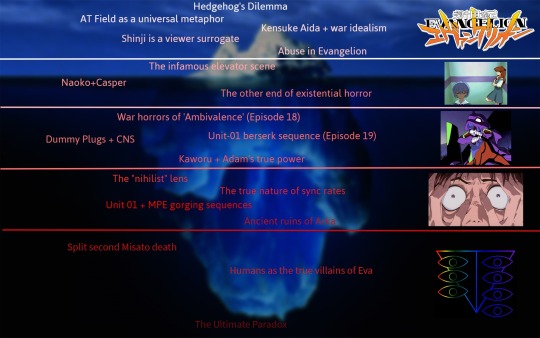
What keeps us all hooked to Eva time and time again? You get through your initial, confused watch of either Evangelion endgame, probably sometime in your adolescence wondering what the hell it is you just watched. The original source material is suffused with unsettling imagery, and sometimes too-close-for-comfort shorts. It’s so much to process that one watch is never enough. The imagery isn’t enough, however, because the mid-to-late-90s series comes with things you’ll pick up the more you focus on certain characters’ struggles or the interesting world-building. They arise little by little with every re-watch, adding onto what interested you in Eva to begin with.
There’s always that little voice asking you “What it is that really draws me here?”
Oh. The horrors.
The tragedy of it all.
These things never leave you the second you bear witness to them, whether you become aware of them or not. You’re disturbed over it, a tad worried, no doubt, but you’re strangely hooked.
Horror works better on limitation, it’s why found footage capturing pale, ghastly, monstrosities of the deep wood will always stand as exponentially terrifying. While most all of us have taken cracks at Eva’s budget at some point, that’s what really drives these terrors home. Its low budget nature made it work.
Evangelion has commentary which forces a viewer to reflect. Most no one enjoys that. It’s the fear, however, that has its audience come back. Evangelion’s reflection alone isn’t what gives Eva it’s charm decades after its run. It’s the little things, most everyone misses, the anxieties, the terrors, all of it. Most of those things, fly over a lot of fans’ heads.
Buckle up, there’s a lot to go through…. (warning for mentions of abuse, body horror, means of suicide, nudity, blood, and gore)
Table of Contents
I. Icebergs for Dummies
Tier 1: The Tip of the Iceberg
II. The Hedgehog’s Dilemma
III. The AT-Field as a Universal Metaphor
IV. Kensuke Aida + War Idealism
V. Shinji is the Audience Surrogate
VI. Abuse in Evangelion
Tier 2: Just Below the Tip
VII. The Infamous Elevator Scene
VIII. Naoko + Casper
IX. The Other End of Existential Horror
Tier 3: The Body of The Iceberg
X. War Horrors of ‘Ambivalence’
XI. Unit-01 Berserk Scene
XII. Dummy Plugs + CNS
XIII. Kaworu + Adam’s True Power
Tier 4: Pre-Abyss
XIV. The “Nihilist” Lens
XV. The True Nature of Sync Rates
XVI. Unit 01+ MPE Gorging Scenes
XVII. Ancient Ruins of Arka
Tier 5: The Abyss
XVIII. Split Second Misato Death
XIX. Humans Are The Villains in Eva
XX. The Ultimate Paradox
XXI. Conclusion
I. Icebergs for Dummies
For those unaware, the iceberg image illustrates that things are much deeper than they appear, just like an actual iceberg. You’ve probably seen this selfsame iceberg--- separated by tiers--- a few times looking through late night internet rabbit holes (Putting it out in the open: I’m personally guilty of this!), fictional or non. It helps you understand why you’re so enticed to certain material, that you’d revisit them. The highest parts of the iceberg are the things in the material most everyone knows, the surface level stuff. The lower you go, however, the lesser known the parts of the material are. These are the things the person are aware of.
Eva has some iceberg illustrations if you look around, albeit they don’t go through the more saddening, sometimes graphic factors of Eva, only theories navigating through Eva’s universe. Evangelion is so deceptively packed with blink-and-you’ll-miss-it subtleties that if an iceberg were centered on that, the diagram would be packed. And I’m being generous as I write this.
A few ground rules, before we begin: The iceberg will deal with the more obscure and dark material as the tiers get higher rather than it only being relegated to obscure bits. The lower the tier, the higher the iceberg and the more subtler the anxieties which graduate into horrors the deeper you go.
Yes, Evangelion is occasionally horrifying. No, Evangelion is not lovecraftian. I think people use the term lovecraftian way too freely. It’s not enough to see something with (sometimes too many) limbs twisted in ungodly angles. Or legs where legs shouldn’t be. The same applies for creatures assuming forms we don’t entirely comprehend. Eva has never delved into the angels being incomprehensibly terrifying specifically because they come from a cosmic expanse.
Some of these actual horrors, big and small, hit you after adolescence, something that makes you feel deeply for the characters’ dilemmas. It’s a feeling that grows and sometimes aches, rather than fades over time for many of us.
Tier 1: The Tip of the Iceberg

II. Hedgehog’s Dilemma
III. The AT Field as a Universal Metaphor
IV. Kensuke Aida + War Idealism
V. Shinji As the Audience Surrogate
VI. Abuse in Evangelion
II. Hedgehog’s Dilemma
Evangelion has its hand in so many psychological and philosophical cookie jars, from Freud, to Maslow, Johari, as well as Dostoevsky. The very tip of the Subtle Horrors of Evangelion Iceberg is something viewers are introduced to in the fourth episode of the series. It is one of the many psychological concepts dotted throughout the original show. Out of all those psychological concepts, this is the most explicit and most recurring.
The Hedgehog’s Dilemma describes the conundrum of two hedgehogs. The closer two hedgehogs become to one another, the more they harm each other with their spines. If you want to properly live, you need the closeness and intimacy of others. By allowing yourself to be close, however, you end up at great risk of being hurt. It’s the very reason what drives those who live to become guarded. Being perpetually apprehensive or building up walls isn’t a remedy for pains, however. The Hedgehog’s Dilemma isn’t just about why people become guarded after relationships ended on bad notes. It’s about the overall inevitability of pain.
Life is a continual push-pull of relationships, because we’re all creatures of comfort. We guard ourselves to varying degrees and sometimes even tell ourselves we won’t get close again, but personal comfort is one of our most ultimate drives.
The Hedgehog’s Dilemma not only describes that harm happens to us anyway, but illustrates that because comfort is universal we seek companionship regardless.
III. The AT-Field as a Universal Metaphor

The AT-Field is the most crucial rabbit hole in understanding the largest meta-narrative of Evangelion.
If Hedgehog’s Dilemma explains the what and the why people become more or less guarded, then AT-Fields explain the how. People build up walls around themselves all the time. You walk away from someone because they crack a smile at you... and it seems off.
Because you feel an anxious pang.
That’s an AT Field.
AT-Fields, or Absolute Terror Fields bear a few metaphors, one of which being boundaries. You see it as Shinji’s fear of becoming intimate, knowing the future implications or Asuka’s masculine protest (putting up a front). We can see an excellent example of the AT Field used by Asuka, her “Wall of Jericho” in episode 9.
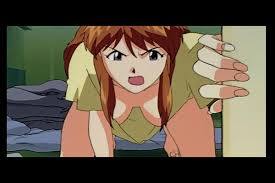
You also see it manifested through the angels, the strange creatures in Eva who supposedly desire to merge with Adam, their mother. Seeing this in the angels makes you realize that the AT Field is actually a metaphor for boundaries which implicates us all. In episode 22, Arael, 15th angel, seeks to understand Asuka. The angel uses its AT-Field (a beam of light) no, its boundary, to breach Asuka’s boundaries.


AT-Fields can be used to not only build up personal walls but to breach them as well. The irony of Arael’s action is that Arael’s AT-Field being erected while it floats just over Earth’s gravitational field makes it immensely similar to the Second Child; they’re both guarded.
The AT-Field is a funny sort of thing because it also sometimes explains how two people who are so alike can be guarded from one another. Sometimes you gain contempt for someone because they’re too much like your least favorable traits. You see this with Shinji and Asuka, both children without their mother desiring validation. Shinji calls Asuka a child midway into episode 9 and Asuka isn’t shy on voicing ideas of Shinji as dense or immature. They’re throwing stones in glass houses.
AT Fields are used to get the user out of dangers both physical and perceived. Sachiel, 3rd angel in the original series’ pilot episode, uses its AT-Field, in the form of flotation, to get itself from enemy fire. It never shows this until it is attacked first.
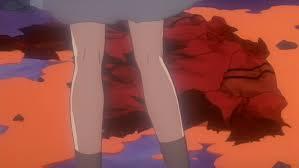
AT Fields are also responsible for one’s identity and physicality in Eva. Without the AT Field you don’t really exist. When Rei assumes the form of the person the character being cast into Instrumentality loved most in End of Evangelion, she’s causing the character to give up their AT Field. With that gone, they lose their physicality, turning into LCL (given the lovely term ‘tanged’ by fans). The ‘tanged’ individual suffers metaphorical death. Evangelion argues that in order for one to exist, others must perceive you and you must perceive you, a point best illustrated in episode 16. Since everyone is converted to LCL, no one really ‘exists.’ Rei describes this unnerving state as the inability of differentiating who you are and others, since everyone lacks a physical state without AT-Fields. Metaphorical death can be argued as worse than physical, since we all exist to make an impression of some sort. It’s what ties all the Eva cast together and the cause of their dilemmas. Validation. You can be living, yet very much forgotten or simply unknown.
There is living and there is “living.”
You can’t “die” unless someone knows you. You were never there. AT Fields are the thing that make us live, but as a drawback, prevents us from understanding each other fully. Kaworu states in episode 24 that AT Fields are the wall of the mind and the heart of the soul, an unapproachable piece of sanctuary. When all else is taken from us, all we have left is our place of respite.
I’d also like to pitch the saddening reality that the AT-Fields are what prevent us from understanding angels as a whole, our genetic siblings as scared of this world as we are. The psychological angels want to understand us, that much is true. The angels, however, use forms of communication at the expense of our boundaries. Because people greatly value boundaries it makes it hard for us to comprehend angels. The creatures are hardly malicious when you realize they wonder why we all do things that actually hurt us, as well as the fact that they do understand our minds. But, because they breach our boundaries, we become even more wary of the (mostly) unknown. Angels may be us, but the strange forms they take are something we aren’t familiar with. The feeling is mutual with angels, wondering why there are many of us, our forms and outward appearances so identical. It’s a truth as old as time that we all fear the unknown.
The anxiety of an AT Field means comprehending that there’s very little chance to 100% get others. Because we’re all wary in some degree, because we’re set in an idea or perception of someone, even if the someone in the past no longer applies. It’s not healthy for you to continue dwelling on relationships not meant to be, keeping yourself up at night asking why, because both of you have closed off each other for good. There’s always that chance the other can come back and if they do seek to understand despite past hardships, that’s good. If they don’t, all you can do is move on and accept it.
IV. Kensuke Aida + War Idealism
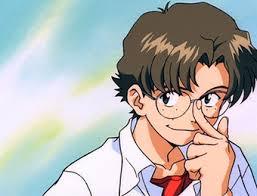
Kensuke is one of Shinji’s classmates, a supporting player in the series. He’s close with Toji Suzuhara, a boy who takes his anger on Shinji, after finding out that his sister has been injured during Shinji’s fight with 3rd angel Sachiel. As Suzuhara beats him down, Kensuke downplays the incident. Kensuke’s and Toji’s relationship is particularly interesting because the latter is affected to some degree by war (the war by humanity to prevent our destruction by angels). Kensuke glorifies the sentient, implicitly eldritch, multi-armored war-machines.
Kensuke can be best described as the ‘wow, cool robots’ drawing you’ve probably seen floating around. This is in relation to Gundam’s war commentary, but replace Gundam with Eva. Kensuke is enamored with the Evangelions and totally, willfully ignorant to the war horrors. Adolescents are forced to be the salvation of humanity, feeling every bit of damage to their own bodies whenever the Evangelion takes any hurt. Even after the war for humanity is long over, the pilots will be afflicted with traumas that will always hang over them.
Kensuke’s glorification is also what draws him to be Shinji’s friend. He uses Shinji’s status as a way of becoming a pilot himself by meeting up with Misato, putting himself at the cockpit of a strange creature magnificent machine.
When Toji becomes hospitalized after his battle in a hijacked Unit-03 vs. A Dummy System-controlled Unit-01, Kensuke expresses discontent at not being a pilot. He’s annoyed because “everyone” but him is a pilot.
Thing is, Kensuke isn’t heartless, just ignorant. Idealism is one of the uglier things that runs thick in the heart of Evangelion. His is one of many cases of unhealthy idealism in Eva, another example of making it difficult for those living to understand one another.
V. Shinji as the Audience Surrogate
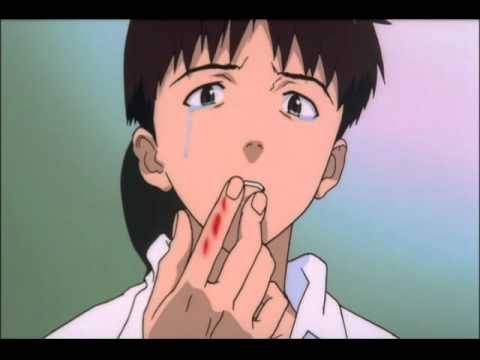
Shinji as the audience surrogate isn’t always touched up on, but is sort of understood subconsciously by a lot of the viewers. Shinji’s character is specific, yet so generalized that him being a surrogate for the audience just… works. Don’t believe me? Shinji gets two psychological exploration-based episodes whereas Asuka and Rei each have one. Episodes 16 and 24 are both psychological angel episodes, albeit the latter is more in-series subversive. The 24th episode doesn’t involve a breach of subconscious boundary, but the pilot (Shinji) is in the hot-seat, being made aware of their issues. Leliel, 12th angel, contacts Shinji in the former of these. Both characters talk to one another, shown as a series of horizontal lines and vertical lines, sometimes intersecting. These lines are a strong reference to the Johari Window, a tool in psychology which helps someone become more aware of themselves. The Window’s quadrants are as follows
1. the part known to the self
2. the part known to others
3. the part known to the self and others
4. the part known to no one
Leliel also states that the self only exists of one perceives themselves as well as others. The angel also states that Shinji could better his reality, to which Shinji absolves himself of responsibility by arguing the horrible state of his reality. It’s a subtle pushing to Shinji and by extension the viewer into free will. Kaworu builds up on these concepts with Eva’s in-universe concept for boundaries. Free Will versus Determinism is brought up here, with the idea that AT-Fields are brought up because the living (again, not people – emotional complexities aren’t only human) will them into existence. By exercising free will, it means enduring pain, one of Shinji’s, and again the audience’s greatest fears. Any relationship has pains and conflicts. This is all a buildup of free will, determinism, self-awareness, and the Hedgehog’s Dilemma. Understanding all of these means swallowing the “pain is inevitable” pill. The problem with much of us is that we like the idea of relationships rather than being in one. We want to feel validated but without the conflict, even if the conflict can be solved. We’re all Shinji because we’re all aware to life’s hellish catch-22s, so we run. There’s times in our lives where we run as far as possible from these woes, these truths, but there’s pain in running too. It’s why escapism seems like such a viable action for some of us.
Pain is inevitable, but pain can be mitigated.
More damning evidence to Shinji being a viewer stand-in lies in either endgame of Evangelion (pun intended). In EoE, after the Komm Susser Tod sequence of everyone on Earth being tanged, we’re treated to a shot of EoE’s live audience.
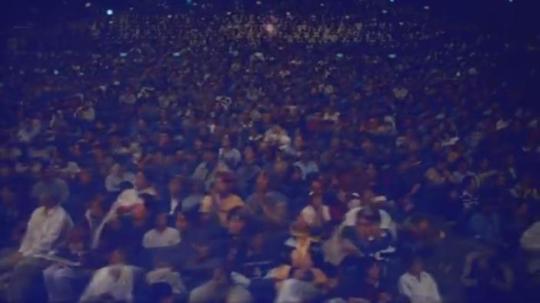
We hear Shinji’s voice about his reality while he talks to Rei toward EoE’s end. There are shots of the city, of people going about their daily lives cementing that this is about us. End of Evangelion shows us a less favorable side of Shinji, a departure from the lauded end series “Congratulations” scene, in which he does understand free will rather than perpetually dwell on negatives. Shinji reacts unfavorably toward Asuka in EoE after his mother’s speech to the audience that ‘anywhere can be paradise’ and Shinji stating he doesn’t know where his happiness resides. Shinji (We) still has a ways to go if he wants to be a better person.
It’s probably why many of us are either inclined to champion Shinji or harangue him, and either reaction is fair. Many of us are aware of audience surrogates, but never to this extent. Shinji isn’t his best person, but he can be. Being his best means self-reflection. Droves of people who first were exposed to Evangelion were teens, and again many of Shinji’s woes are specific yet so generalized, hence our feelings of defense and possibly disgust.
No one likes scathing, yet accurate call-outs on their person, but they’re paramount for us to understand ourselves and others.
VI. Abuse in Evangelion
One of the worst things recurring in all of original Evangelion is a bevvy of abuses.
Abuse comes in many shapes and forms and it’s many characters’ realities. Abuse happens not because the universe ‘wills it’ (determinism aka, ‘that’s just how people are’). Abuse, be it conscious emotional absence, actual neglect, among other ungodly acts fly though the cast.
Abuse is cyclical and a lot of those doing it often get away with murder because they have power.
Much of Eva is comprised of children being forced to sort through adults’ emotional baggage. Those children become adults and the cycle continues.
We all know a Gendo. Or even perhaps a Misato. Hell, even a Ritsuko.
Anno states that Gendo’s character is of a societal meta-text, which explains many viewers’ ire in relation to the character. He’s responsible for many of the seedy goings-on in Evangelion be it the financial (see: Jet Alone’s orchestrated out-of-control nature to give NERV more funding) or abuses (see: Rei, Shinji, Ritsuko, and, Naoko). It’s for this reason why Gendo’s actions are a sore spot for a lot of fans.
Anno: I’m not sure that it’s a real father [that Gendo represents]. Well, not a father in the sense of a parent with a blood relation to his child, but more, I think, [in the sense of being] a representative of society or the system. That’s why he has that expression.
Takekuma: So, he’s kind of amorphous.
Anno: The angels are the same. I made them appear amorphous in that way because, for me, society is unclear, the enemy is unclear.
Takekuma: Gendo is [a representation of] the boundries or the pressure of society itself.
Anno: That might be it. Perhaps Gendo is [a representation of] society itself.
http://wiki.evageeks.org/Statements_by_Evangelion_Staff
After many re-watches of certain Eva episodes, it just hit me, as I’m writing this why I’m sometimes apprehensive on an adult-exclusive lens of the show. This happens a lot in adolescence and our struggles are made trivial because of the mishandled baggage. As children, you’re meant to be subservient to parental whims. You have this sort of obligation to solve their problems. Give them closure. It doesn’t even need to be parental baggage, but just from adults in general. You see the way the adults act not just with the children but with each other. You see the way Gendo justifies neglecting Shinji, objectifying Naoko and Ritsuko or Naoko’s emotional absences as a mother to her daughter (also manifested through the MAGI). It’s these immature excuses as to why they can’t extend empathy to those around them.
It’s always excuses.
Eva’s original series has always been a show about children.
Tier 2: Just Below the Tip

VII. The Infamous Elevator Scene
VIII. Naoko + Casper
IX. The Other End of Existential Horror
VII. The Infamous Elevator Scene
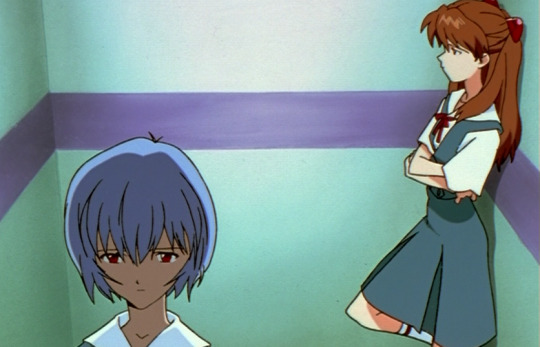
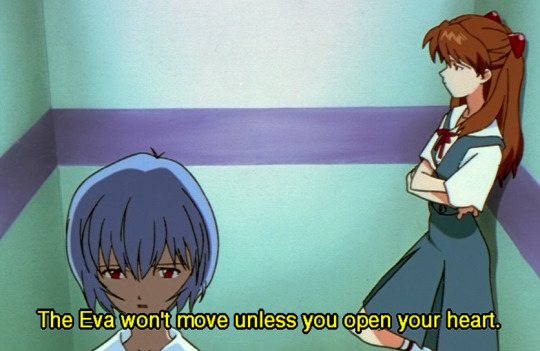
The Elevator Scene is a sequence that sometimes gets glossed over due to Evangelion’s fleeting budget. It took me years to realize the true gravity of the awkward silence of both the 22nd episode and its Director’s Cut version. The Director’s Cut version has Asuka abruptly jerking in the silence, but that blink-and-you’ll-miss-it moment speaks volumes. Understanding the scene means understanding why Asuka quietly stews in her anger. Understanding why Asuka stews means understanding Asuka from her debut to her emotional breakdown.
Asuka’s appearance in the 8th episode, Asuka Strikes!, is marked by a bold persona that carries on until the end. She isn’t shy on imparting her prowess to Shinji, stating that Units 00 as well as 01 were the prototype and the test type, respectively. Her Evangelion, Unit-02 is the finished product. She even states that she graduated from university. Despite these impressive feats so early in adolescence, the only time in which they’re noted is when Asuka talks of them. Misato takes in both Shinji and Asuka, but only ever “dotes” on Shinji. Gendo pays attention to Shinji because he pilots Unit-01, and 01 contains the soul of his late wife. Rei is the clone of Gendo’s late wife, hence Gendo’s attention and overall creepy, selfish obsession with her. Asuka and Shinji’s relationship, with Misato as their caretaker strongly mimics a Golden Child and the Second Fiddle. The only difference is, Shinji gains more attention due to Gendo’s and Misato’s respective baggage. Again, Eva is a series where children are forced to handle the baggage (with no break in the cycle) and when the child doesn’t have anything the adult particularly can clue in on, they become neglected.
That’s Asuka’s dilemma.
It’s why Asuka forces herself to grow up.
It’s why Asuka is driven to be competitive to Shinji and Rei, later growing contemptible at both.
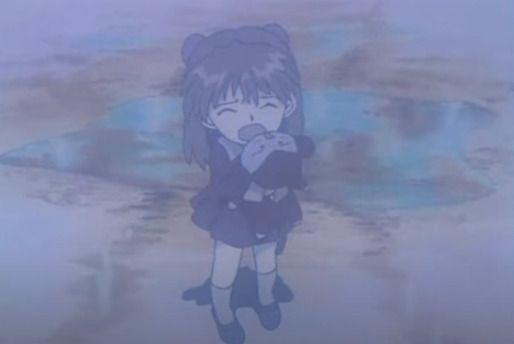

Asuka suffers a few curses, one of which being the youngest, the inevitability of being consciously sidelined dawns on her, leading to her selfsame breakdown toward series’ end. She aligns youth with trivialization, so naturally, she’d front with the opposite. She never gets help in relation to her period. Misato and Ritsuko realize something is up with Asuka but they never really offer her the support.
There’s also the flashback to her trauma in episode 22’s beginning. She’s replaced by her mother post-Contact Experiment (which led to a deterioration of her mental health) via a doll that looks like her, red hair in pigtails. It’s the leading factor to her feigned boldness, her ego. The way in which she is marginalized in the series brings it all back.
Rei breaks the silence with a few words of compassion and all Asuka can do is express disbelief. She mistakes compassion for contempt.
For pity.
The idea that anyone would extend kindness, especially now of all times, is unbelievable.

Asuka also experiences a dilemma here, a dilemma those like her face. She already knows what it means to be vulnerable and deeply hurt, but she needs to make herself vulnerable because now, more than ever, she needs the support. Being vulnerable will cause past traumas to flood back in full force, but by stewing she deprives herself of any support. Rei offers that support, but a few words of support in a wave of trivialization can’t help but feel a bit too strange.
Asuka’s greatest anxiety is realized in the twenty second episode. It’s of being and staying second fiddle, that she’s always been set up to fail. Even 2 episodes after the fact, in which she actually starves herself does she realize once more how she’s permanently ‘below’ others.
Asuka’s curse finds itself in real life, and it’s for that reason why I believe some find themselves resonating with her. Asuka’s gradual descent into bitterness is something I find myself waking up some nights thinking about after 7 years going through Eva; hers is a cautionary tale on being emotionally distant to cries of a damaged youth. Casually imparted knowledge of past achievements, and the competitive attitude mixed with embitterment, some of which from a genuine place but also a product of neglect. We were forced to play second fiddle, we forced ourselves to grow up to feel more legitimate, forced to carry an ire that stews because it seems no one listens.
VIII. Naoko+Casper
The late Naoko Akagi is a woman of multitudes. Those multitudes are compartmentalized into the 3 MAGI. They are Balthasar, Melchior, and Casper.
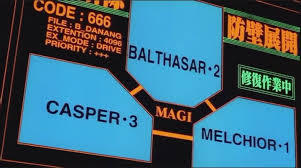
Casper shows itself to be the most prominent aspect of Naoko’s personality, her as a woman. Ritsuko states that, after the defeat of Iruel, 11th angel, that Casper is the part of her mother which remained that way to the end.
Balthasar and Melchior have been bested, be it by rival MAGI, or Iruel’s assault. This calls back to the fact that Naoko’s other facets aren’t anywhere near as prominent. Naoko has cited her own emotional negligence, of only showing emotions should it ever benefit her.
Casper on 3 occasions fights tooth and nail, Iruel’s assault, an attack by multiple MAGI in End of Evangelion or the defiance of Ritsuko activating the self-destruct sequence. Ritsuko does this to seek vengeance against Gendo for coming to the immense realization that he never genuinely cared for her. Gendo has always used Ritsuko for her body. This would destroy NERV, meaning killing herself and Gendo.
Then you realize why Casper overrides the sequence.
Casper’s stubborn behavior wasn’t actually to defend NERV but to protect Gendo. Casper’s defiance aka Naoko’s emotional absence toward her daughter allowed Gendo to kill a bewildered, rightfully angered Ritsuko.
The saddest part of Casper’s, no, Naoko’s choice is that Naoko got away with murder. Evangelion is a story about children dealing with the selfishness of adults and the adults never receiving justice for their wrongdoings. The relationship between Ritsuko and Naoko is an excellent example that this doesn’t just implicate the young pilots. Ritsuko dies in End of Evangelion with the truth that her mother, as a woman, in the end chose the man who manipulated both of them.
IX. The Other End of Existential Horror
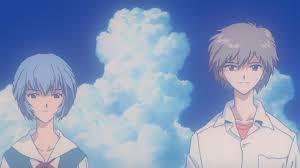
Some spend their whole lives trying to make a mark. Others can’t help but be known.
People get smart sometimes to get themselves out of a current situation. Kaworu and Rei’s existences are such that they’re deadlocked from living. Their existences are the product of an experiment, to be later heavily watched and raised as the Last Messenger. The latter is the result of Gendo’s obsession with his late wife.
Kaworu and Rei’s existential crises are opposite from the rest of the cast; while others do their damndest to become known, they cannot be unknown. Rei’s character centering more around her identity than other characters is also initially and sneakily alluded in the opening.

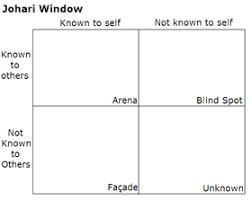
The Johari Window is a tool encouraging self-awareness in the person, alluded to twice in the show, with the second time being in the sixteenth episode. Both usages of that illustration, for Rei, and Shinji drive home crucial aspects of the meta-text.
This would also tie Rei to Shinji in End of Evangelion forcing Shinji to reflect on his own awareness and will. Rei is an astute, young girl whose arc is about her personal relationship with identity, something she is all too familiar with due to her objectified nature. Rei’s arc is even more so entrenched in identity than other characters that she is one of the characters imparting personal and universal realities.
Ayanami Rei’s existence from start to finish is inundated with the issues of others, causing her to internalize being always expendable. In Rei’s Poem in episode 14, it becomes clear that she sees herself based on usage. She likens herself to a field of flowers, which slyly alludes to the Dummy System’s “parts” 9 episodes later, other Reis.

Rei is seen as malleable vessel which houses thoughts rather than her own person and she can’t do anything about it. So she resigns to her reality. Even if she does tell off Gendo in End of Evangelion for his objectifying, she’s not even out of the woods. She never will be.
I used to think Rei’s “slap” to the face to the man with the (most) baggage was empowering. Then I learned about abuse during adolescence, how kids who lack a support system act while away from their abusers. Even saying an emphatic “fuck you” to your abusers isn’t enough to be a happy ending. Rei is a girl who lacks a support system and she suffers from it. Start to finish.
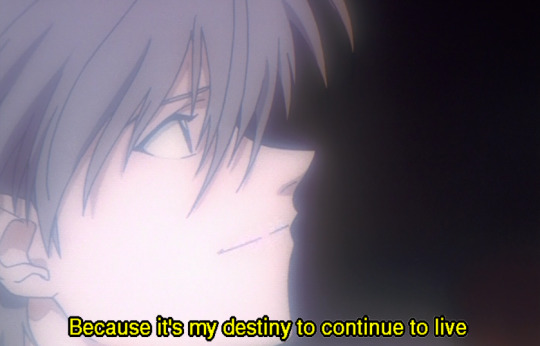
Kaworu’s crises are much trickier to pinpoint because there’s so little to work with. He doesn’t get an episode dealing with personal, subconscious explorations. Getting his character means first getting how Evangelion re-contextualizes what “Ode to Joy” symbolizes. It also means understanding the AT-Field and most people won’t pick that up on an initial foray. Or maybe even a second. Most people don’t pick up that the AT Field implicates anything living and physical or its metaphor for boundaries and identity. There’s the common misconception that Evangelion is a “human” show.
Kaworu marks off his appearance humming “Ode to Joy” while Shinji wonders who to turn to. It’s a song generally known for its jovial nature, but most importantly, Ode to Joy is:
known also as the “Choral” Symphony. Its finale is a musical setting of Friedrich von Schiller ’s “Ode to Joy,” a hymn to the unity and freedom of humanity.
http://www.dictionary.com/browse/ninth-symphony
The Choral Symphony assumes a more horrific context later on. Kaworu is the last messenger and what his action is would lead to the mass annihilation to lilin/human or angels. ‘Unity of man’ is changed in Eva’s context – it marks either unity of man or the death of man. It doesn’t matter who Kaworu allows unity to, because his hands would be stained with death anyway. Then you realize why Kaworu deploys his most powerful AT Field during his descent to Heaven’s Door.
This is his reality.
Kaworu’s status as the Angel of Free Will isn’t about him being the only complex angel, as a lot of people think. It’s about being the sole individual handing that freedom to others.
You realize his terrifying dilemma goes to the tune of being feared for his own existence as an angel (which he notes to Shinji) and not being able to properly live.
Sometimes you ”hurt” people by existing.
Sometimes people hate you for the simple act of existing.
Kaworu’s and Rei’s terror is the other end of existential horror, that you can’t help but forced to be known. Sometimes you have knowledge but aren’t allowed to do much with it.
Tier 3: The Body of The Iceberg

X. War Horrors of ‘Ambivalence’
XI. Unit-01 Berserk Scene
XII. Dummy Plugs + CNS
XIII. Kaworu + Adam’s True Power
X. War Horrors of ‘Ambivalence’
Episode 18 is where anxieties graduate into horrors both implied and visceral. Unease hangs over the episode, with the mystery of Unit-04’s disappearance and tests being done on Unit-03. Misato tells Shinji that because tests would be done, there’d be a pilot there. Misato uneasily withholds this info from Shinji and Kensuke breaks the silence with his recurring desire of being a pilot, still ignorant of the war horrors. There’s a subtlety that Shinji picks up on with Toji but not enough to put two and two together: that the big-eater himself isn’t feeling so hot.
The continual chirp of cicadas and birds nor the peel of the school bell are enough to break the unease of the viewer or of Toji. Toji goes from indirectly being affected by war vs angels to being chosen, drafted even, a child at the first line of defense for the apocalypse. We get a flashback of him beating down Shinji, before it cuts back to present day Toji. He will be in Shinji’s shoes.
Toji balls a fist, a recurring theme in Eva, to the tune of “What is your hand for?” Toji is finally about to take things into his own hands.
Asuka takes a few cracks at Shinji to Hikari that he hasn’t quite gotten the memo, but when Shinji asks her even she’s halted in words.
Then the day comes.
Tests are being done and suddenly Unit-03 goes rogue with Toji in her (note the Evangelions have the souls of the pilots’ mothers, save for Rei). Unit-03’s’s strange behavior is revealed to be the work of the 13th angel, Bardiel. Shinji’s ignorance is made worse by Misato’s absence (with Misato telling Ritsuko she’d tell Shinji the pilot’s info after the tests). Units 00 through 02 are sent out for the new threat and Shinji sees this new threat. Anxiety rises.
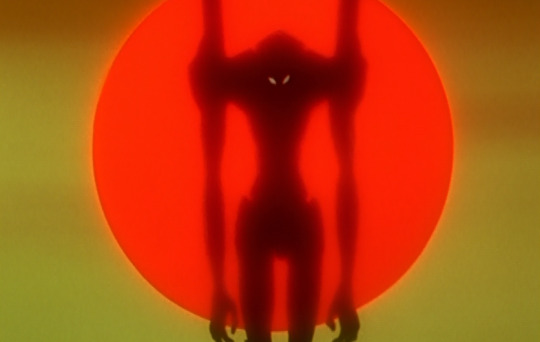
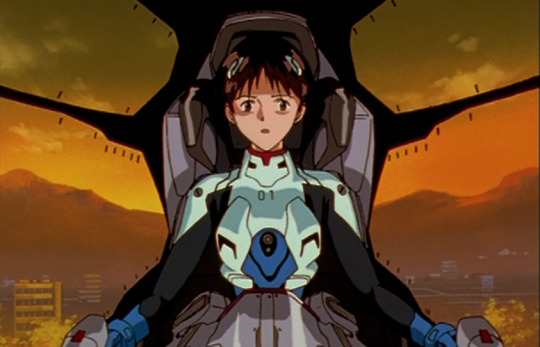
The song “Marking Time Waiting for Death” accentuates the anxiety. Unit-03’s silhouette eerily contrasts with the sun, her body slightly hunched and approaching slowly.
Fear washes over Shinji when he deduces that with an Evangelion inside, there must be a pilot.
Yet he still doesn’t know.
The other pilots are aware, and show reluctance to the revelation. A hijacked Unit-03 sets herself on Asuka, Rei, and even strangling Shinji. Shinji allows the angel-hijacked-being to strangle him, because killing another human being is simply horrific.

Eva has its hand in the war morals cookie jar here because Shinji stands at a conundrum, to other let this creature take his life or to murder flesh and blood. This dilemma goes double-time in war. Gendo asks why Shinji hasn’t dealt with the 13th yet, with a somewhat horrified Shinji pleading about the pilot. Gendo commands for the unfinished Dummy System to override Shinji’s controls and then suddenly...silence….
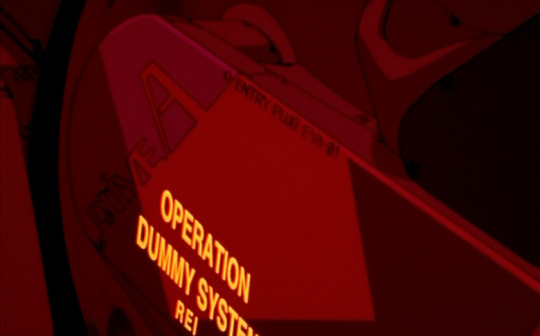
The Dummy Controlled Unit-01 springs back and we’re treated to a close-up of Unit-03/Bardi3l being strangled.


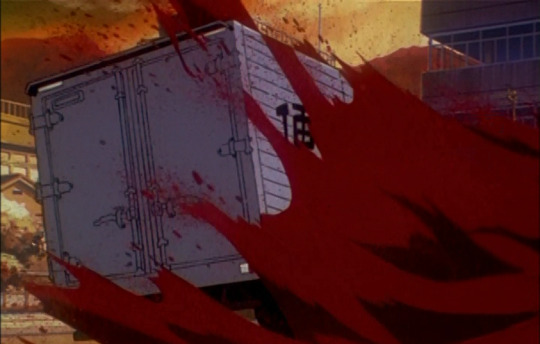
A nauseating crunch sounds and the unit goes limp. A controlled Unit-01 proceeds to raise hell on the incapacitated enemy, resulting in the unit’s blood and guts flowing through the streets. NERV’s personnel can’t do anything save for become fearful at the Dummy System’s capabilities. Terrible, visceral noises sound one by one as blows strike, as the unit’s severed limbs and blood splatters riddle the urban battlefield. Shinji hears every second, every squelch and splat.
Imagine the pain of 03’s pilot.
But the terrors don’t cease here.

01 doesn’t stop at just raising hell on the incapacitated 03, and we’re treated to another close-up shot of 01 tightly holding onto 03’s entry plug, before crushing it.
Somewhere away, Misato receives news that Unit-03 has been dispatched as an angel. Shinji feels the weight of having actually killed someone, before Misato actually breaks the news that the pilot is not only alive but that the greatly injured pilot is his classmate.
It never really hit me until now how this scene holds another horrifying subtlety. Compare this to episode 3, where Toji’s first interaction with Shinji involved him punching him, the very scene playing at this episode’s beginning. The 18th episode ends now with ,Toji and Shinji are both joined in the same camp, of children emotionally and physically marred by war, not able to fully control their situations.
XI. Unit-01 Berserk Sequence
Shinji stands in a situation where he can no longer take the terrors aligned with the Evangelion. He’s gone from sustaining injuries great and small from combat with the eldritch angels, to indirectly harming a friend through it. He resigns from his position as a pilot, understandably running away even with the approach of the 14th angel.
After a talk with Kaji about how he can control his future and he only, Shinji once again puts himself at the forefront of further pains. He must once more thrust himself to the terrors that align with the war-machines whilst struggling with other traumas.
During his fight against Zeruel, his Evangelion dies out and it all floods back to him. Shinji once again finds himself at a position of no power, frantically pressing at his controls to no avail.

He can only hear blow after blow of the 14th’s onslaught. He and Unit-01 are at their most vulnerable.
Until Unit-01 springs back.
W hat follows is the famous Berserk sequence, a scene whose terror can be thanks to Evangelion’s low budget.
We see the Evangelion in all her terror and the sort of off-ness that carries in this scene.

Episode 19 has no problems on treating us to front-row tickets to terror.
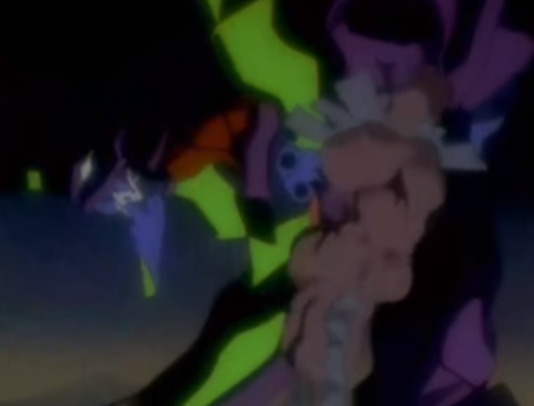
Unit-01 snatches part of Zeruel’s appendage and adds it to her mass. A sickening squelch sounds and her new appendage contorts into place in an instant.
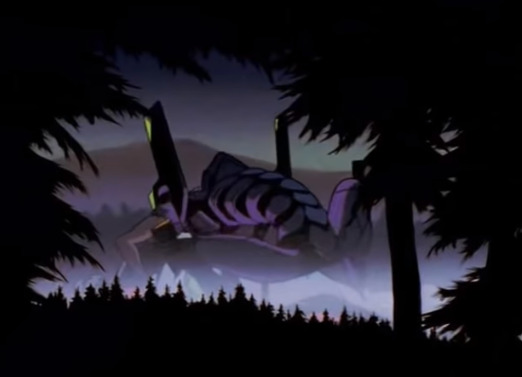

She moves over to her incapacitated, angelic meal and doesn’t hesitate to chow down. The shots feel too personal yet nowhere near in the sense of the show’s meta-textual reflections. It’s almost like stumbling on a cryptid and when she shoots a look at the viewer, it feels as if she’s looking at us, like we’ve interrupted her dinner. Or perhaps she did finish the meal... and she’s in the mood for seconds? Perhaps even thirds?
The bizarre and eldritch nature of the Evangelions goes full force with this imagery. Episodes 2 and 16 laid the foundation of how off the Evangelion Unit-01 was with how she openly mutilates her targets. Or even the unsettling roar of Unit-01 that’s not entirely bestial. The sound is straddles a line between the blood-curdling bestial and the human. But here? Eva Unit-01’s position, from her hunched figure, to her more feral position as she feasts, feels far too organic...and far too human.
The Evas themselves aren’t human, but the souls housed within are. Eva’s souls are souls of the respective pilots’ mothers, an example of the mother and child symbolism omnipresent in Neon Genesis Evangelion.
Shinji’s mother is Yui and as we go through the series, we realize the s2 engine appliance was intentional. An s2 engine offers infinite stores of energy and this is needed for Instrumentality. With the s2 engine within her grasp and the fact that Evas don’t subsist on anything, this would make the consumption of 14th completely recreational.
It’s super tempting to frame this scene as containing some abomination that now stands unchained and indiscriminate in its targets, but it isn’t. It’s sort of understandable because Units 00 and 02 don’t come close to exhibiting this sort of behavior nor were they in this circumstance. Neither Unit-00 nor 02 have any desires in regard to Instrumentality. In the end, we should look to Yui and her own endgame, because Yui’s running the show here.
XII. Dummy Plugs + CNS
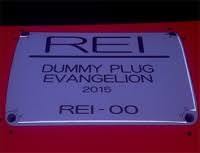
Ritsuko states the Dummy Plugs are machines which imitate pilot’s thinking. There’s a bit more than the possibility of this being 100% AI due to the apparatus Rei is in.
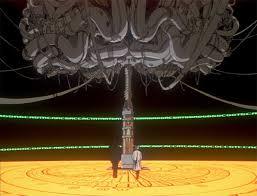
This very likely implies the respective person’s thought processes added with AI programmed in a way which best “describes” the pilot (basically how they are perceived). In episode 17, Rei is situated in this apparatus strongly resembling the central nervous system, the brain and the spinal cord.
{The central nervous system CNS is responsible for integrating sensory information and responding accordingly. It consists of two main components:
1. The spinal cord serves as a conduit for signals between the brain and the rest of the body. It also controls simple musculoskeletal reflexes without input from the brain.
2. The brain is responsible for integrating most sensory information and coordinating body function, both consciously and unconsciously. Complex functions such as thinking and feeling as well as regulation of homeostasis are attributable to different parts of the brain.
https://mcb.berkeley.edu/courses/mcb135e/central.html
Ritsuko imparts the unsettling revelation about Rei and by extension the Dummy Plant itself (after Misato coerced her into learning about Rei). The Reis are the core of the Dummy Plugs (and the System used to brutalize a hijacked Unit-03 and its trapped pilot). This scene adds more to the extent of Rei’s objectification, of her being replaced. It adds on to Rei III’s comment of being ‘the third.’
Rei isn’t savage by any means but the sheer brutality of Dummy System’d Unit-01 5 episodes prior may hint at her straightforward nature.
I’d like to pitch that Ritsuko’s approach to Rei’s Dummy Data was also the product of her subtle animosity toward Rei. When she refers to the Dummy Plug as a machine which mimics human thinking, she’s talking about Rei. She also refers to her similarly in episode 23 by referring to Rei as spare parts, as if Rei herself is some soulless machine whose parts can be switched out if need be. This could also call back to Rei’s poem, in which she calls herself a vessel which holds human thoughts.
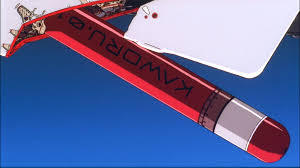
Another question remains: how does Kaworu play into this?
The MPEs (the Mass Production Evangelion series) use Kaworu’s Dummy data, meaning that there are cloned Kaworus stored off somewhere, perhaps floating with soulless smiles the same as Rei has.
Treated as spare parts.
This also implies that Kaworu is more or less reduced to an object.
What’s more disturbing is the nature of the MPEs gratuitous method of ravaging and mutilating Unit-02 and by extension Asuka.
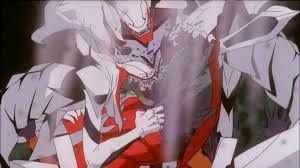
Kaworu hasn’t ever demonstrated any degree of malice, so this can’t really insinuate a ‘Kaworu is secretly evil’ narrative. But this can tie back to a recurring theme of humans fearing and despising angels. It’s because of this that the revelation of our genetically identical nature or the fact that they can comprehend our psychology is framed in-show as kind of shocking. It is because we’re so disturbed at the angels’ existence (or anything else we don’t comprehend) that we view them as inherently savage in nature. Kaworu’s quick-to-perceive personality most likely translated itself along with the AI. This would also rule in the somewhat strategic way in which the MPEs act against Asuka, exploiting her attack patterns through surprise attacks.
Some of Kaworu’s as well as Rei’s Dummy Data are the product of universal (Kaworu) and personal (Rei) contempt by people. Let that sink in.
XIII. Kaworu’s + Adam’s True Power
The bottom of the fridge horror portion of this iceberg is something that has subtly plagued me for years. We’ve only ever caught glimpses of Kaworu’s abilities in his debut episode. I picked up on it little by little with each re-watch of the episode, with every other time his abilities dawning on me. If I wasn’t focusing on how his character fits in the greater framework of Evangelion, I was cluing in on his abilities.

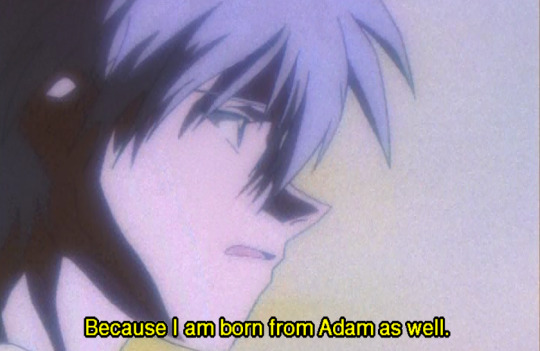
One of his abilities is being able to block out light, magnetism, and subatomic particles. Some of the forces which make up the universe. This witnessed by the viewer when he realizes the whole of humanity’s welfare hangs by a thread, due to the coexistence of angels and Adam.
Adam.
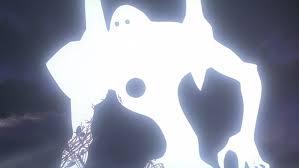
Adam’s soul lies within Kaworu. Adam. Who utilized an Anti-AT Field which caused Second Impact. An Anti-AT Field, which killed off much of the Katsuragi Crew in Antarctica.
This makes Kaworu the most powerful angel in the original Evangelion series.
Eva has shown that ownership of an angel’s soul (or partially, if you’re onboard the Rei I is in Unit-00 theory) allows the person to inherit the angel’s abilities through Rei. Rei blocks off Kaworu’s immensely powerful field with one of her own, canceling out both as a result. As we know, AT Fields for people are a figurative affair. People lack the physiology to exhibit a physical AT Field because they don’t have cores like angels do. Angels’ souls when possessed by humans have a sort of ability to circumvent parts of human physiology (if you’re looking for the whole package, you should eat angel’s flesh too). Rei also shows the ability to float, implied in episode 24 and shown explicitly in End of Evangelion.
But this raises a few questions about the last messenger is the ability to block out some of the forces of the universe Adam’s powers or Kaworu’s? Another ability that continues to plague me the more I think about it is Kaworu’s AT-Field usage on Heaven’s Door to bypass its lock.
We haven’t actually seen Adam’s other powers (if the angel has any) because the it’s anti-AT Field was halted via Lance of Longinus. Other than its ethereal appearance in flashbacks, we only see an incapacitated Adam in embryonic form. That’s it. We don’t know if Adam exhibits any other powers due to this impediment. If Adam does have more powers, this would add onto both the fridge horror factor of Adam and Kaworu.
Tier 4: Pre-Abyss

XIV. The “Nihilist” Lens
XV. The True Nature of Sync Rates
XVI. Unit 01+ MPE Gorging Scenes
XVII. Ancient Ruins of Arka
XIV. The “Nihilist” Lens
There’s something that implicates the whole cast. Something that goes beyond the meaning of the AT-Field, and the all-too-known Hedgehog’s Dilemma.
Eva is filled to the very brim with psychological concepts, but there’s one thing which ties this all together. It goes much larger than the desire to become validated or cycles of abuse and unresolved issues to a newer generation.
Free Will Vs. Determinism ties the entire cast together and is disturbing in its own right. It not only ties the cast together but also contributes to Eva’s meta-narrative.


Episode 16’s sequence with Leliel, Shinji, and the Johari Window gives little breadcrumbs to this psychological dilemma. Leliel teaches Shinji about his own identity as well as slowly ushering him to a sense of self-awareness. Leliel also attempts to usher Shinji out of filtering reality with only convenient parts. Shinji argues that he can’t really be held culpable for his actions, because the one and only reality is that reality is awful, bar none. Not his reality, but reality as a whole. This deterministic stance becomes ever more blatant 8 episodes later with the appearance of Nagisa Kaworu.
Kaworu’s designation is the angel of free will. The irony of this stands in the fact that Kaworu isn’t the only angel who can exhibit free will (with some of the angels before him taking the time to try comprehending people). Kaworu’s status comes from his identity as the last messenger, bringing about freedom for one species (humans/lilin or angels) at the expense of the other. Kaworu knows his reality well and in the end, seeks to better the reality of those around him. Eva doesn’t romanticize the prospect of free will, however, because Kaworu is so aware of his own person and how he can hurt those around him that it greatly bothers him.
The metatext doesn’t just position Shinji as being in the wrong, but also the audience. Remember the point I made before about Shinji being the audience substitute? It’s further hammered home from the series’ tail end and into End of Evangelion.
“That’s just the way things are.” is a common response to things in life we feel resigned on changing, because we don’t know how to change them. This quote is a parallel to Shinji’s “humans aren’t made to float!” in episode 16.
Shinji does know how to change much of his reality, but by doing so he’d be pushed into free will. Free Will is the solution and it means holding yourself accountable rather than believe that it’s everyone else with the problem. With the idea that you can change your reality, it offers you the opportunity to love yourself.
If you love yourself, then it becomes much easier to love others.
Eva’s free will and determinism metatext hammers home the extension of empathy.
Shinji/the viewer’s greatest problem is that because we don’t love ourselves it makes it difficult to extend the love to everyone else. Shinji’s love translates as idealism. Because of his unhealthy idealism, he is hindered from understanding people.
By ascribing your beliefs from determinism to free will, it opens your mind to an entire world of possibilities, but therein lies the terror. It is because of these possibilities that Shinji and by extension, the viewer, likely fears free will. Shinji finds ways make himself validated, but with free will, the argument could be made that it doesn’t matter. There’s the anxiety-crippling likelihood that none of it actually matters, because your existence doesn’t matter. If we’re going on this bent, acts of making an adequate impression on others are acts of personal denial. In the end, these are what they are, possibilities.
The greatest terror of it all is that we don’t know.
User power-chords makes an excellent point about the inherent darkness of an internal locus of control.
User power-chords posits the idea of existential absurdity for Shinji not as a certainty but a possibility. There’s always a likelihood that our desires to comprehend the world around us, to find ultimate understanding are in vain.
Cheesy as it sounds, people fear ambiguity because we seek a satisfying end. We don’t just seek answers. We want outside closure and inner peace, but we won’t always get it. It’s why we rationalize relationships that end on bad notes. Sometimes you worry about your falling-outs...and it hurts. You never got the answers your wanted so this pain carries, for months, sometimes even for years. Dwelling on the issue serves no purpose other than to keep that hurt with you. The best thing to do sometimes is to find your own closure, your own meaning.
No, Evangelion isn’t actually pro-nihilism, but it presents us with that likelihood. That’s what makes this aspect of the narrative so terrifying: The consideration that we find meaning in the meaningless.
XV. The True Nature of Sync Rates
The nature of injuries and having them in adds onto the innate horror --be it war or otherwise-- and themes of the Evangelion. The severity of the injury is based on how high the pilot’s sync ratio is. An average rate while sustaining damage will bring hurt to the actual pilot in the respective spot. Some examples:
Sachiel makes multiple headblows to Unit-01 and Shinji in episode 2, causing head trauma.
Ramiel’s, (5th angel), particle beam attack in episode 6, an attack so severe that Shinji needed medical care.
Unit-00 and Rei being infected by a Bardiel hijacked Unit-03 in episode 18. Toji’s condition in episode 18 stands as a large example of the innately disturbing nature of sustained injuries.
Toji’s condition becomes all the more nauseating when you see Evangelion parts and blood flow through Tokyo-3.
Toji could feel every last second of strangulation, body blow, and feel the unspeakable pain of his arm being severed. Let that sink in.
Asuka receives the worst of these considering the nature of her sync rate being high. The higher the rate the more kept the damage is. The circumstances behind Asuka getting the worst of it goes back to the AT-Field. Asuka understood the meaning of the AT-Field, that the more you open yourself up to others, the more hurt you become. The realization dawns on Asuka as her mother from within the Evangelion shields her from the onslaught of JSSDF troops.
It’s then that Asuka finally comprehends what the Absolute Terror Field is. Despite her emotional needs being neglected, realizing she’s set up to fail, and going comatose she still goes on.
Asuka, despite everything, takes a chance and opens her heart knowing the double-edged nature of the AT Field. What happens next?
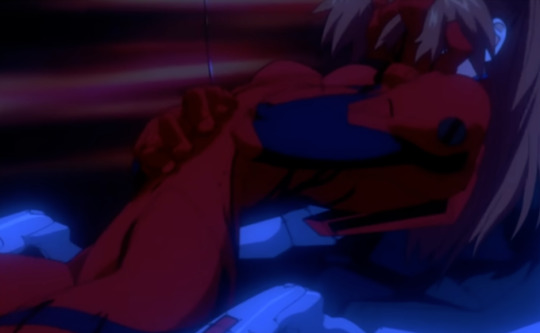
Asuka took a chance.
She opened her heart...
...and she got hurt all because she opened herself.
XVI. Unit 01+MPE Gorging Sequences
The brutality of both Unit-01 and the Mass Production Evas holds three layers: of visual horror, implied horror, and thematic horror. Unit-01, after taking Zeruel’s s2 engine into herself, proceeds to then brutalize the 14th angel by way of still gorging on it. The feeding was entirely recreational considering Evangelions don’t subsist on food to function. This was more about the sheer act of brutality for brutality’ sake.
The Mass Production Evas also fall under this category, the way in which they deal with Asuka after incapacitating her with a replicated Lance of Longinus is also sadistic and gratuitous. They also proceed to gorge on Asuka, her fate made worse through the simple fact that her sync rate is heightened.

The MPEs don’t even swiftly finish her off. She is in a state of tremendous and unimaginable pain. They fly above her slowly, circling above her mangled Eva.
They are almost mocking her as she can do nothing, save for writhe. Asuka’s seething, repeated “I’ll kill you...I’ll kill you….” is then silenced by the MPEs spearing her down.
The brutality doesn’t end there, as we see much darker implications of the damage sustained toward the end of the first half of End of Evangelion.
Shinji bears witness to the implications after seeing the decimated remains of Unit-02 being carried off by some of the Mass Production Units. The sickening reality of it all dawns on him and he is once more exposed to the woes of war and the nightmarish aspect tied of the Evangelions.
XVII. Ancient Ruins of Arqa
We’re ending the pre-abyssal end of the iceberg with Evangelion’s original proposal.
Eva’s proposal, a far cry to the show today, had a more sci-fi angle to it. Psychological concepts weren’t exactly pitched nor was it self-aware. The angels weren’t even referred to as the angels, but as the Apostolos. Instead of the 18 we were presented with in the original show and the movies, there were 28 Apostolos.
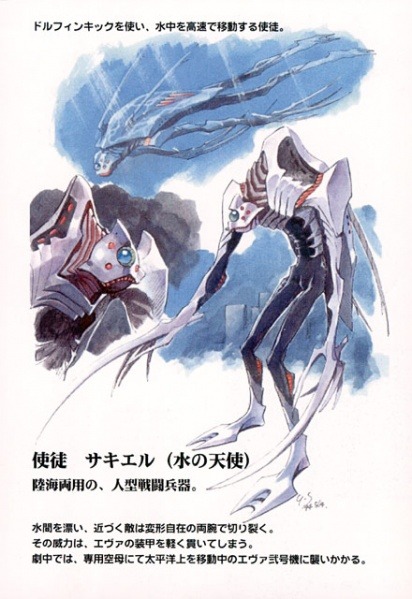
The Apostolos designs stand as testament to how far of a departure the proposal was to the final cut. They look far more menacing than the more amorphous, much softer defined, beady-eyed angels we’re used to. To top it all off, the Apostolos were the de facto villains of Evangelion’s prototype pitch. The Apostolos in the Proposal, toward the end, proceed their onslaught as a group rather than the series’ one by one. Toward the series’ end, the 12 strongest Apostolos begin their assault on North America, annihilating the continent in its entirety.
Only 12 of the creatures laid waste to a singular continent.
Episode 24: "Now, the Promised Time"
Rei breaks down. Her secrets are revealed. At last awakened, the twelve strongest Apostolos descend from the Moon. Both Eva Unit-06 and the American continent vanish completely. Humans acknowledge their helplessness in the face of the Apostolos' crushing power. The promised time, when people will return to nothing, approaches. A human drama in the depths of despair.
Episode 25: "Arqa, the Promised Land"
The laboratory holds the ancient ruins of Arqa, which have become key. In order to stop the twelve Apostolos, the United Nations' head members annul the Human Instrumentality Project and resolve to destroy the Apostolos. Shinji's father objects. Shinji and the others stay at the laboratory for Rei. A drama of people conflicting over incongruous objectives.
https://wiki.evageeks.org/Resources:Neon_Genesis_Evangelion_Proposal_(Translation)
The aforesaid creatures were so powerful in the original pitch that Human Instrumentality and the ancient ruins of Arqa would be the way of stopping the onslaught.
Tier 5: The Abyss

XVIII. Split Second Misato Death
XIX. Humans Are The Villains in Eva
XX. The Ultimate Paradox
XVIII. Split Second Misato Death
As the last and most explicit aspect of original Evangelion, it would only make sense that EoE specific content would take its place in Tier 5. End of Evangelion is a 90 + minute tour de force with disturbing imagery back-to-back. Split Second Misato Death refers to one of the most unsettling images sprinkled all throughout the movie. Here are a few of the many examples of EoE’s building up on Evangelion’s ugliest parts.
Everyone cites the infamous hospital scene not even 5 minutes into the film as the first proof, but user power-chords has pointed out, Shinji has actually attempted suicide (refer to the ‘Free Will v. Determinism’ part of the iceberg.)
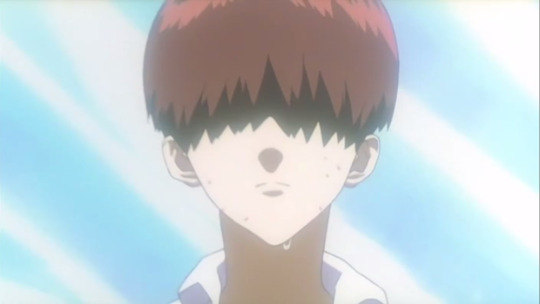
After Misato is mortally wounded and sends Shinji off in an elevator not long after, the JSSDF blow up that part of NERV. A few people have pointed out the most disturbing facet of this scene: through freeze-framing that you can actually see Misato’s body during.
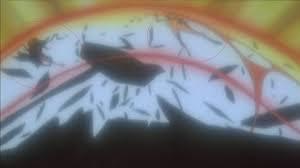
The JSSDF scene partway through End of Evangelion in which NERV personnel are summarily annihilated.
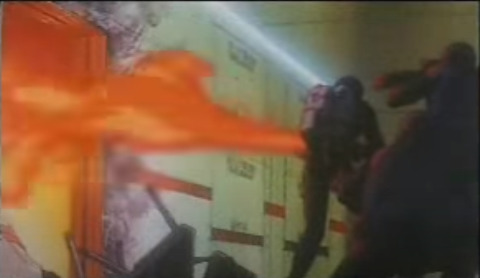
For those missing the small detail of Shinji’s attempted suicide ,Shinji’s depressed state is made more clear when the JSSDF locate him. When they do they attempt to kill him execution style. Shinji doesn’t move.
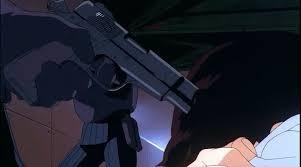
“I don’t want to die…!” during the JSSDF’s assault, Asuka is awoken from comatose state. She is protected by her mother via an AT-Field by Unit-02. She gains back her self-preservation after this realization, and multitude of images play. One of them is an extremely gruesome close-up of Asuka’s face. (extreme body horror warning, proceed with caution)
The Komm Susser Tod scene beginning with Shinji strangling Asuka in harsh coloring, Naoko’s same action toward Rei plays right after. A few disturbing child drawings follow after, predominantly featuring death. (seizure warning, body horror warning)
End of Evangelion’s flooring nature comes from the fact that it builds up on the subtly horrific and makes these terrors explicit. Whatever existed beyond closed doors becomes now available for us to see,
XVIII. Humans Are The Villains in Eva
At the penultimate point of the abyss lies a horror as old as much of time. Of the humane being more disgusting than the monsters.
That we can be monstrous.
This fact becomes known with the appearance of the JSSDF as dispatched by SEELE, methodically mowing down NERV personnel with little to no weaponry of their own. We’re treated to NERV’s personnel in their hallways, some forced with the moral dilemma of leaving their own to die while surviving or helping their own while both end up being gunned down.
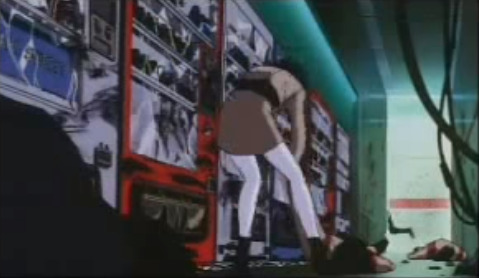
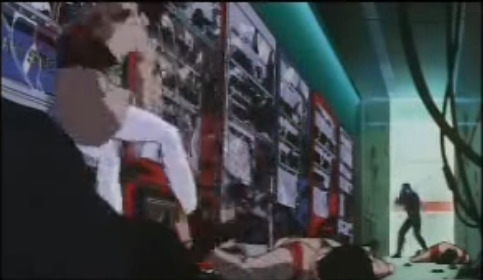
It becomes apparent that SEELE has been gradually, intentionally chipping away at NERV’s Defense Budget, getting rid of the (little) competition they have after the defeat of the Last Messenger.
There’s a degree of contempt and casual sadism that comes with how they kill the personnel. In one instance, a NERV worker surrenders to the JSSDF, before being killed off in execution style in the distance (one headshot plus two extra shots for good measure).
When you look back at it, this sort of sheer, unabashed brutality wasn’t felt about the angels. Human attitude about the angels is largely fearing, anxious. This attitude accentuated itself through a sometimes nervous soundscape. Of observing these weird, ghastly creatures as they creep and swim. And the feeling’s mutual. The problem is that we don’t know.
But here? We do know.
When the JSSDF move in, the anxiety of angels graduates to the full-force dread of creatures that have killed before. The greatest enemy to humanity has always been with them all along, forcing them to a catch-22. The dread falls on Maya because she understands this perfectly. NERV has only ever shot at targets rather than living flesh…
...and SEELE knows this.
SEELE’s slow, but sure suppression of NERV’s budget is kicking a man while he’s down, but the man in question is a child instead. The JSSDF have more than enough firepower, calling it overkill goes beyond an understatement.
The JSSDF demonstrate the lack of remorse further with the discovery of Third Child, Shinji Ikari. One of the members presses the barrel to Shinji’s head before Misato steps in and kills the members.
The JSSDF isn’t the only damning evidence of how ugly members of humanity can be, however.
Humanity’s on-occasion grossness shows itself in small ways throughout the series, in dislike and conscious emotional distance for individuals, or beliefs of the angels being unintelligent and/or savage. Other times it manifests fiscally, in orchestrating more ethical approaches to stopping certain destruction to go seemingly haywire in order for NERV to receive more funding. This all due to a rival company of NERV challenging the very idea for its usage of child soldiers.

The worst of this damning fact is that many of the morally repugnant members exist on a higher echelon of society. There are Gendos running around, doing as they so please and they’re the tip of their echelon iceberg.
XIX. The Ultimate Paradox of Evangelion
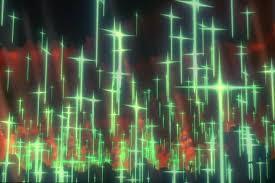
“Anywhere can be paradise as long as you have the will to live.”
We’re treated to these words as Shinji finds himself on shores surrounded by an isolate hellscape, with Asuka next to him. The strange and altogether horrific nature of End of Evangelion has gotten fans believing on End of Evangelion’s endgame was in certain, nihilistic. But Eva dipping its hand in the likelihood of meaning in the existentially meaningless isn’t even the ultimate terror of Eva’s self-aware universe, nor is it the tendency for man to become contemptible towards itself.
Evangelion greatest terror is the paradoxical nature of free will.
Yui’s words to her son as she drifts off into the ever-expanding cosmos, her status as a deity realized, is that paradise is universal. EoE assumes this unconventionally positive approach to a whole series worth of characters’ woes. The issue is: finding paradise is ultimately conditional.
Free Will’s paradoxical nature is what gives credence to the ongoing Free Will vs. Determinism dilemma. People can use their free will to take away yours entirely and this is most evident with Rei. Her existence is the result of a man’s unhealthy attachment to his wife, her lack of self-preservation the result of being conditioned as a multi-purpose vessel; her desire to merge with Lilith to become an omnipresent mother-figure was not hers. The nature of disallowing free will exists on a spectrum, as people can use their free will not to take away the whole of others’ freedoms, but to disallow them proper emotional growth. The adults around Asuka weren’t around for her during the series, leading to her eventual downfall.
Unit-01, throughout much of the second part of EoE holds the power to give or deny people’s physicality due to her status of having both Fruits of Life (the s2 engine held by angels) and Wisdom (from the Lance of Longinus merged with the Eva earlier on). This gives Unit-01 her deity status and while within Lilith-Rei, Shinji realizes that not everyone would be there in his life, that he can’t be in the center of others’ lives. It’s for that reason why he denies people’s physicality (“They can all just die.”), which turns people into LCL.
Shinji gives allows people the ability to come back from Instrumentality after realization arises that without other people, there’s no way to tell if Shinji, himself exists or not. Kaworu and Rei also give him the reality that with people back, pain will become an inevitability once more. With all the souls gathered by Lilith-Rei, they are released after her death.
With the souls of those cast into Instrumentality dispersed, those turned into LCL now hold the ability to come back from Instrumentality if they so choose.
While the idea of anywhere being paradise rings true, it’s not entirely satisfying to say that EoE is unconventional in its uplifting message to the viewer. Evangelion is at its core a cautionary tale. It warns the viewer into extensions of empathy and openness that others would properly live. This goes double for those with power. Without that compassion, we’ll have Asukas, Misatos, Ristukos, as well as Reis, those in the world whose downfalls come from emotional absences, neglect, objectification, and forced baggage. We would have Shinjis, those wanting to be at the nexus of others’ importance because they were deprived while young.
Kindness is a powerful thing and the lack of compassion present in all of Eva implicates most everyone. It leads to yet more abusive cycles, with the only thing breaking that cycle being a hand for those in need.
XX. Conclusion
What more can be said over this juggernaut which is a host to a bevvy of darkness? Evangelion is testament that anxieties and horror don’t need to start out as blatantly shocking or visceral to make an impact years down the line. They also don’t need to be out in the open to initially hook you either. You pick up on a few anxieties as well as horrors and you realize deep down, there must be more, which drives many of us to engage in this often times unabashedly dark source material.
Some of us are doing it later in the throes of adolescences, others are doing so well into their 20s, possibly dipping into their 30s. Point is, it draws in a lot of us and for a lot of us, it doesn’t ever let go.
Some of its charm could be chalked to the visceral ways in which characters interact. Even after years of re-watches, I’m still learning new things about the child soldiers, and I’m quite sure there’s others finding small details. There’s also the possibility of Eva’s approach to terror. I think Evangelion “humanized” its horror. It didn’t make horror a universally human feeling, but made it so that the true big bads looking to cause apocalypse weren’t actually the eldritch. Many of the angels are more or less lost kids looking for their mother (I still think Ramiel’s “singing” in episode 5 was it calling for its mother!).
With those newer details after 20+ years, there will be more added to the iceberg. Hell, there should be more added to the iceberg. This iceberg is the tip of an even greater iceberg. I’m still learning about their adults and their desires as well, how cyclical their actions are. For others, the draw-in factor lies in its low budget. Personally, it’s all of these for me: the low budget helped cement these darker aspects of the series due to horror and the genre’s overall relationship with limitation. It works best on limitation and had Eva worked with a much higher budget, I don’t think the content would be as effective, or perhaps it’d be much more difficult to make it so.
Evangelion is such a well-done, deceptively compact series that each lens a fan assumes has its own interesting rabbit hole. Your circumstance shapes the experience, and this too involves how you navigate the series’ menagerie of terrors.
I’d also like to thank the reader for getting through the largest rabbit hole in Evangelion. I’d also like to thank you for getting through the whole of this meta from a fan who slowly began to resonate with the characters as the years went on!
#neon genesis evangelion#shinji#kaworu#asuka#rei#seizure warning#body horror warning#suicide mention#correct me if im wrong#credit goes to twitter user decoratedboar for the iceberg picture help#and fixes
3K notes
·
View notes
Text
THE YEAR IS 2020 AND I WATCHED NEON GENESIS EVANGELION FOR THE FIRST TIME, PART 12
Episode 24.
It seems very unfair of us to watch Dorohedoro after Evangelion, because each episode of the former concludes by telling us things we've learned. I feel like all I've learned from Evangelion is "fuck the colour orange".
This is also the episode where I cursed that the episode length of Devilman Crybaby and Madoka didn't sync up with Evangelion so we never got the power trifecta of 'my first homoerotic teenage nihilist crush'.
The actual episode report under the cut.
So, so, so after last week's upsetting underground tang aquarium of Reis adventure the series remembers to check in on the super-traumatized Asuka (which is more than the adults within the series do). We get a greyscale small child Asuka running down an orange (bad) corridor. She's excitedly telling her mother about how she's been chosen to pilot a giant robot and protect humanity and it'll be with other kids and she won't be alone and won't need to depend on her father or anyone else and the excited child shots keep cutting to an ominous door. Eventually the door opens enough to show the red behind it and, knowing what we know from the Asuka episode a few weeks back, you can interpolate pretty easily and upsettingly what opening door onto solid red means.
There's a fight between Shinji and Asuka that we're catching the climax of, with thrown and shattered mugs, and Asuka calling Shinji a liar and Shinji apparently reiterating that fuckin' Kaji is gone (I can't tell if he's trying to tell her Kaji is dead or just that he’s bailed on them).
Misato's gotten notice from Seele, the obelisk council, that the Fifth Child is being sent to replace Asuka and Misato recognizes something hinky is going on and senses conspiracy which is ... pretty reasonable at this point. I'd also be seeing conspiracies everywhere. I wouldn't know what they meant or even whose conspiracies they were, but I'd definitely suspect multiple conspiracies going on if literally anything new happened.
Asuka, naked, maybe bloody? in a bathtub in a destroyed apartment with the ceiling crumbling down. Her eyes are vacant and her cheeks are hollow and she's mumbling about her sync rates falling. It's weird and haunting and the building is as destroyed and non-functional as Asuka. Someone from NERV finds her and it turns out Asuka's been missing for a fucking /week/ in this destroyed city and they've only just found her since I guess she ran away after her fight with Shinji and you know it's at least partially because they don't care about finding her. NERV barely cared about Asuka back when she could get in the robot, they absolutely don't care about her now and it's unclear who, if anyone, is responsible for her since fuckin' Kaji's death. Is there even law in Tokyo 3?
My point is, everything is falling apart in the structure of the show and the world within it and the first ball to truly get dropped and broken is the used up and now valueless teenage girl and it's heartbreaking.
Things are getting so real that Misato is /sending Penpen away/ for his own safety and I'm glad Misato cares about Penpen but I wish Misato could find it in her to care about, say, Asuka (Misato is a fuck up and trying her best, but at the end of the day she's still a fuck up). Is Misato the best adult in the series or is she actually the worst adult in the series because she recognizes how she is failing but fails to take action to correct her failures? As a viewer I can't be disappointed in Gendo because he's shit and I have no expectations of him. But I love Misato and so it hurts more when she lets me down and by this point she is letting me down HARD (but I suppose Misato disappoints herself).
Shinji is also in a bad place and he's contemplating the orange tang wreckage of the city and how the small thread of normalcy has gone now that everyone's evacuated. Shinji misses his friends who ... hoo boy.
The one Shinji last saw in the hospital after nearly killing him via giant robot and the other he last heard calling him to tell him how much he sucked for not wanting to pilot a giant robot. It's sad that those two are as close to friends as Shinji has had.
Shinji desperately wants to talk to someone right now about, you know, the /underground tang aquarium full of Reis/ which it seems to be implied is a result of forbidden science experiments combining Adam Trevor flesh with the remains of Shinji's mother? No one SAYS it but yes?
So Shinji can't talk to Rei about this because he feels weird about the whole thing. Asuka's missing. His friends, such as they were, are gone. The poor kid just needs someone to talk to, to confide in, and he asks Asuka, Misato, and his mother, in that order, for help. Are all women ultimately mother for him? Rei, Misato, and Asuka all got conflated when he was absorbed into the EVA which were all part of an ur-mother thing so ... maybe? I don't know. Probably nobody knows. Shinji certainly doesn't know.
Then Shinji's thoughts are interrupted by Akira Ishida humming "Ode to Joy" (gorgeous piece of music, loved it since I was a little girl) and Akira Ishida is here! Things are not going to get more sensical when Akira Ishida just appears in your anime.
So this is Kaworu, who is sitting on some picturesque rubble jutting out from the orange tang, and he's the replacement EVA pilot. His hobbies are having mysteriously deleted records, perching on things, knowing about Shinji, and talking deep and cryptic, but in a friendly way.
AT SOME POINT IN THIS EPISODE Gendo talks to Shinji's EVA and refers to it by his dead wife's name and is glad the spear of Longinus is on the moon, actually, because with it on the moon it can't stand in the way of their plans and Gendo has an eyeball in his palm.
The obelisk council have a meeting where they are once again berating and complaining about Gendo and it is unclear if they realize that Gendo's not there.
Misato is pretty sure Kaworu is a spy or agent of some sort sent by the obelisk council and she and the dude NERV subordinate who's always around are trying to do some side snooping to figure out what his deal is.
Hey where's Ritsuko? Sitting on a chair in a black void telling Gendo about how her cat died and she didn't think about it at all for years until her grandmother called to tell her it was dead and now she's having feelings about it and Gendo doesn't care about symbolism. Gendo wants to know why Ritsuko destroyed the dummy plugs and Ritsuko is like, I didn't destroy the dummy plugs, I destroyed Rei which ... I don't know, I don't know, are we all operating at cross-purposes here Ritsuko? Are you and Gendo even having the same conversation?
Gendo's like ... is this because I stopped having sex with you? And ... maybe that conversation went further but I think my brain strangled itself rather than contemplate Gendo viewing sex with anyone as a favour he's doing them and one Gendo finds inconvenient (and gross at that).
Rei's having a time and as is often the case with Rei it's unclear what she thinks about what she's thinking? Rei seems like she's a cypher to herself more than she is to anyone else. Rei's maybe trying to figure out what her purpose in life is or who she's alive for? She thinks about Gendo's glasses and something's different with this Rei, I guess, compared to the other Reis. I think something's breaking down, like maybe each new Rei is less and less connected to Gendo? I don't know.
At some point, Rei encounters Kaworu and he's like oh hey, you're like me, I thought so! Maybe they're at NERV or on their way to NERV? Look, the budget ball got dropped with Asuka, this shit is getting impressionistic. So maybe Kaworu doesn't have any background for Misato to dig up because, like Rei, he's a construct from some weird genetic fuckery (I think Misato even compares his lack of background to Rei at one point) anyway he's like it's episode 24 time to drop Lilith references!
Why are you doing this to me, Akira Ishida? If I had one of those murder evidence string boards it would be such a mess right now as I tried to find room for /Lilith/.
Misato's reached the point of fuck it, let's just throw all the kids into the robots for tests and Kaworu is /suspiciously good at robot numbers/.
After robots, Shinji is just sort of hanging around when Kaworu exits ... something NERV-y and Shinji is awkward and shy and doesn't want to go home and needs to take a shower and Kaworu is ... intense and suggestive and friendly. So they shower together and then bathe together and there's, like, an entire wall in the baths that's dedicated to a screensaver slideshow of NERV propaganda and Kaworu just wants to talk to Shinji and get to know him and hold hands in the bath and it's obviously weird.
Shinji is so desperate for friendship and someone to talk to and you don't want to see conspiracy or shady shit here because at this point I just want something /good/ to happen to Shinji for once in this constant tragedy train of a show. Just let him have this weird friend who wants to talk to Shinji about his intimacy issues and how his fear of being alone makes him keep to himself and causes the aloneness because chosen aloneness is better than risking connection and getting rejection. So probably the biggest red flag about Kaworu is that he's talking to Shinji about the things Shinji is concerned about without any overt robot-centric motives.
Then Kaworu invites himself over for a sleepover. Shinji takes the floor because of course he does and they talk more philosophy and fate and destiny and depression and Kaworu is intense and tells Shinji he likes him and no one has given Shinji even this crumb before.
The obelisk council has a meeting that isn't in the void but is over the tang craters of the ruined city and they're meeting with Kaworu because of course Kaworu is their construct of some sort being sent to ... something ... Gendo ... moons ... Lilith ... Adam ...
Misato is watching all of this from the highway through highspec binoculars and cursing that she can't read Kaworu's lips. She's looking at the back of his head, mind you. But I heard what Kaworu said and I don't fucking know, Misato, so don't feel bad.
Misato meets Ritsuko in the black void at some point and if I knew why in the moment I have since forgotten. I don't take notes. I just watch. Misato's angry, though and Ritsuko is just ... overcome with a sense of her own failure or maybe grief or anger at her inability to not repeat her mother's mistakes? There's definitely mom-stuff involved.
I'm aware that these reports are becoming longer and less coherent and also probably less interesting for people to read but once I decide to do a thing I do it. There's definitely a loss of narrative cohesion as the series nears its end, probably due to budget stuff.
It's an episode for people to talk to the EVAs in their giant hangers and Kaworu goes to have a chat with Asuka's robot where chat means 'starts floating and establishes some kind of mental link with the EVA and turns it on'.
In the NERV control centre everyone starts freaking out at the sudden activation of the EVA. IS IT ASUKA? they ask (no, she's shown to be barely conscious in a hospital bed, so someone's caring for her to some degree). NO PLUG, NO PILOT, JUST KAWORU'S PSYCHIC MANIPULATION.
Oh, and Kaworu's an Angel which means an Angel is now using an EVA to punch through ... NERV ... ground ... basement ... heading to where Adam Trevor is, the orange tang ocean, and that's really bad. If he/they succeed ... Third Impact?
Shinji's called in (and Misato hasn't talked to Shinji once about Kaworu even though the last time there was a new surprise EVA pilot it went ... poorly and, well, here we are now) and he's angry and sad and disbelieving (echoing Asuka's disbelief at the beginning). Shinji feels so /betrayed/ and he compares what Kaworu has done to his relationship with his father which is ... a lot to unpack. I suppose the friendship Kaworu offered is the most obvious affection Shinji has been offered by anyone. He wants affection and recognition from Gendo. But any affection, any seeing and noticing of him, must be like water in the desert to Shinji at this point, and if Gendo's greatest betrayal of Shinji's hopes was overriding his will to make Shinji nearly kill Tohji I guess Kaworu, the only character who's shown any interest in being Shinji's friend, being revealed to be an Angel, something Shinji /has/ to kill, is comparable. I'm sorry, Shinji.
Shinji fights Asuka's EVA, controlled by Kaworu, as they descend deeper and deeper into the bowels under NERV, the two EVAs locked into a very cool looking combat that Shinji doesn't want to be involved in, and Misato and her underling confirm plan SELF-DESTRUCT NERV.
"Ode to Joy" is playing throughout this. It feels very natural.
Kaworu gets to where Adam Trevor is, weird and white and bulgy, looking very pregnant and Adam Trevor is also Lilith and they are the parent of humanity while the Angels are maybe less tainted children of god and are siblings to the EVAs?
Shinji throws Asuka's destroyed EVA through the ... wall? into the orange tang ocean zone with Kaworu and Adam Trevor Lilith and since Shinji's the victor of that fight, he seizes Kaworu, who he still does not want to fight, let alone kill. Kaworu's calm about all of this, though. He's ready to die. He expects to die. He also is ready to live but he recognizes this is a situation where for one of them to survive, the other one can't, and he smiles and tells Shinji he wants Shinji to live.
There's once again a really excellent use of the budget and animation limitations the show was hitting at this point, as there's a long, still shot of Shinji's EVA holding Kaworu as "Ode to Joy" soars, the music the only sound for the static shot.
Then the screen flashes and a small shadowy shape sinks into the orange.
Gendo and Rei wear raincoats as blood is hosed off Shinji's EVA.
Shinji sits by Misato, devastated, and tries to express his feelings to her, express his grief and regret. Kaworu was a good person. Kaworu was his friend. Kaworu told Shinji he liked him and Shinji confirms that /no one has ever told him that before/. Shinji feels like he should have died instead of Kaworu. He felt awful about Tohji's near-death at his unwilling hands. Tohji wasn't even really his friend. His grief and culpability in his own loss here is ... huge. And all Misato can say is that Shinji did the right thing in killing his friend. She's the only adult who's been sometimes sympathetic to Shinji, who he's been forging a real connection with, but by this point she's had to deal with so much shit of her own that the fragile pseudo-parent-child relationship between them has shattered. Misato is just another adult who isn't hearing Shinji. He doesn't know why it's changed, he just knows she's telling him killing his friend was right. This concludes my report on Episode 24 of Neon Genesis Evangelion.
Edit: I know there was a lot of discussion and criticism when Netflix released their new dub and sub, particularly with respect to the line "worthy of his grace" and we can all agree, I think, that Netflix's subtitles are sloppy, their localization flawed. But regardless of the words used, it's clear that Kaworu offers Shinji everything he isn't getting from the rest of the world: affection, understanding, intimacy, a sense of being valued, a sense of safety. Love in whatever form, every form Shinji needs and wants.
I guess I wonder how genuine this offer of love is although I suppose it doesn't matter to Shinji because the betrayal happens, the universe punishes him for risking emotional intimacy, and Kaworu's sincerity doesn't change how awful Shinji is left feeling.
1 note
·
View note
Note
I bet you have probably seen Neon Genesis Evangelion. If so, what do you like or don't like about it?(I'm talking about the original series, not the rebuild movies).
A lot of NGE detractors cite Shinji’s wimpiness as a problem with the story, but I think when people say that they’re actually identifying a visible symptom of a much more significant problem: inconsistent pacing.
If I step back and examine NGE the show structurally, I can divide it pretty cleanly into three distinct parts:
1. Episodes 1-6
2. Episodes 7-16
3. Episodes 17-26
The first part, which is the shortest, introduces the situation and stakes, establishes Shinji’s psychological problems about getting into the mech, and culminates with a large, climactic battle against Cube 2 Hypercube in which the heroic efforts by everyone (literally everyone, as all of Japan comes together to provide electricity for one superpowered attack) inspire Shinji to do what is demanded of him. The amount of narrative content packed into these six episodes is huge, because there’s also the development of the relationship between Shinji and Rei that serves as kind of a microcosm for Shinji’s ability to trust, depend on, and help other people, and which also sees a narrative resolution in the final episode when the two work together to defeat their enemy.
Episode 7 is essentially a filler episode, then Episode 8 introduces Asuka. I get, conceptually, the idea behind Asuka and what she’s supposed to provide to the plot. She is, in essence, a fiery, hypermotivated soldier who wants nothing more to get into the mech and prove herself, which juxtaposes her against Shinji’s reluctance. But I think, narratively, Asuka is redundant, as her role has essentially already been filled by Shinji’s classmates Toji and Glasses. Asuka adds a sort of gender dynamic to that question by being female while Shinji’s classmates were male, but ultimately not much dimension has really been added to a question that was already posed and resolved in the first 6 episodes. (I know you mentioned you weren’t talking about the Rebuild movies, but think about how effortlessly those films substituted Asuka for Toji in the experimental Unit 03 plot; these two characters really are doing the exact same thing narratively.) Asuka receives way more narrative weight that Toji does, has a huge flashy introduction episode, gets a lot more screen time, et cetera, but she hasn’t changed much of anything and because of that the next few episodes, which frequently focus on her role, are often pretty stagnant in the grand scheme of things. There are several obvious filler episodes where Shinji and the gals take on Monster-of-the-Week type angels who fail to live up to the massive narrative weight and big, flashy scale of Cube 2 Hypercube back in Episodes 5 and 6. As such, the story sinks into a dull holding pattern, one that lasts longer than the entire, densely-packed first arc. The pacing, in short, has gone from “fast” to “dead stop.” Nothing is developing, not the characters, not the story, not even the sense of scale or the stakes. The middle of NGE is a gaping black hole that only becomes more frustrating as the third part begins.
I think I would ordinarily want to put Episodes 17 and 18 into the previous part, because what should very obviously be a culminating moment for flashy new character Asuka gets stolen from her and given to (now irrelevant) Toji. If it were Asuka who gets into Unit 03, it would sort of justify the second part, although not its length or arduous pacing. But because Asuka is completely divorced from the Unit 03 subplot, I’ve decided to organize it into the climactic third part, where NGE seems to remember it’s supposed to have stakes. However, there’s another extremely frustrating element about these two episodes, because after them, Shinji regresses back to the reluctant (or unwilling) hero he was all the way back before the Hypercube fight. It’s this moment of regression, I think, that drives so many people batty about Shinji as a character, because NGE just topped off 9 to 11 episodes of nothing really happening with a huge moment of plot de-advancement. I think if this moment came shortly after Episode 6, with Asuka being more heavily involved in it, it plays out a lot better. But because of the show’s massively inconsistent pacing, the frustrations the viewer feels for the narrative itself are dropped onto Shinji and make him come across as kind of obnoxious. The fact that it’s irrelevant Toji who sparks this regression in Shinji is also a misstep; it just makes it a lot more difficult to empathize with Shinji when this tragedy has occurred to a character who barely rises above the background. (And in classic anime fashion, the show pulls a massive punch and doesn’t even kill Toji, when it really needs to be hitting as hard as humanly possible to sell this regression.)
By Episode 19, the narrative is basically back to where it started in Episode 1, with a couple more characters floating around and a smaller number of angels left to fight. Basically, the first 18 episodes don’t matter that much. It’s here where NGE actually starts, and also actually starts to get good. If you can get past the the huge frustration of Shinji’s regression, NGE very quickly returns to the fast pace and ramping scale/stakes of Episodes 1-6. The angels become more threatening and difficult to defeat, the characters start to break down emotionally and literally, the sense that things are slanting toward a disastrous conclusion grows and grows. And it finally culminates in End of Evangelion, which I would consider close to a masterpiece, an excellent film where my largest criticisms are that it’s shackled so strongly to the uneven show that came before it.
The first two Rebuild moves, while sacrificing the excellent visuals of the show and injecting a few stupid elements like Mari Illustrious, resolve a ton of the problems I have with the original. Asuka gets put into Unit 03, while Toji and the other schoolkids are correctly reduced to only the barest of roles. The distended post-Asuka midsection is slimmed down significantly and more emphasis is placed on using it to drive Asuka into that climactic Unit 03 moment. Unfortunately, Rebuild 3 is kind of a hilarious mess that makes zero sense, but oh well.
Overall, NGE is a strong story with extremely high heights muddled by some fairly quotidian narrative missteps. It’s worth it for EoE, though. That movie is phenomenal.
8 notes
·
View notes
Text
. . .
So, I was in the mood to rewatch Evangelion 3.33.
And to be honest, it's a lot deeper than people give it credit.
You miss a TON just by watching it normally.
Your brain can't process all of that information all at once rapid-fire.
So, what I did was, set the English subtitles, and frequently paused it from frame to frame, occasionally going back a few frames to look at certain key elements.
The dialogue is just as important as what you see in the film, so having the script in front of me opened my eyes a lot to everything that was going on and why people were saying things in certain ways.
I watched it in Japanese, so I could get a better idea of how things were being conveyed.
The story plays with the idea that Asuka is Shinji's enemy, at almost every turn, even though it's hidden in one scene that she does at least seem indirectly glad that he's still alive, despite all the loss surrounding the EVA children.
This reminded me of Asuka's insecurities in the original TV show, and reverses the roles both Shinji and Asuka had. Asuka always wanted to be acknowledged and given a role... while Shinji had no care for such things... this time those feelings are reversed. Asuka could care less of anything that's going on (even if she carries herself like a soldier), and Shinji is the one seeking importance and value.
Shinji suddenly getting Suzuhara's shirt hints at the idea that his whole class at school was being used by Nerv, and you can see the gears turning in Shinji's head as he begins to see how deep this rabbit hole goes.
Then there's the whole Piano sequence with Kaoru, and I was instantly reminded of the synchronization sequence between Shinji and Asuka... and how vital that was for one particular battle. It played several roles here too.
When the truth is presented, Shinji refuses to accept the reality as Fuyutski presented it to him, even talking to the Rei Copy, expecting her to become something she could never be (reading books). But her inability to be what he wants forces him to angrily acknowledge reality.
There's a point in the film where Shinji is literally seething with rage, his saliva dripping from his teeth, and the way his Japanese voice carries this is so poignant and human, that you can literally sense the level of Shinji's suffering.
Kaoru tries to comfort Shinji, but the only way he can do so is by taking on Shinji's burden for him... But even this is something Kaoru cannot completely accomplish, as his is limited and still "human" too.
You even see Kaoru hesitating and even warning Shinji to not be rash, but part of the reason Shinji doesn't listen is because of his belief in Kaoru...
Fuyutsuki said in passing that the world can easily be broken, and that remaking it would not be easy... and although Shinji may not have been listening to him clearly at that time... Shinji came to believe that he and Kaoru were capable of recreating the world.
This is actually the opposite of the Shinji we see in End of Evangelion, who simply detached himself from the world before it could be remade fully and simply let things be.
This Shinji clearly wants to remake things for the better, start over, and not wallow in the pain of being a "sinner".
But one key thing about the "sin" that Shinji bore, it wasn't a sin he alone was responsible for.
Even if Shinji made poor decisions, things were set up in a way so that those decisions would be catastrophic rather than heroic. In other words, the setup wasn't entirely Shinji's role... he was just put in the role of the trigger of the mechanism.
Humanity often has this very egotistical and conceited way of thinking that drives us to assume that we are entirely responsible for our actions.
When you go to play a sport and you score 10 points... is that entirely your doing?
No, the rules determine when you score, your teammates help you score, and you yourself are comprised of several million organisms in your body helping you run and jump around TO score!
This is Hideaki Anno's message: self conceit can blind people to the fact we are not as significant as we might appear.
This appears again when Shinji and Kaoru are staring at the stars in the sky... it calms Shinji and allows him to forget his own so-called importance.
The idea of committing a sin against the world and its people... it is not something one person is entirely capable of doing on their own, no matter how much blame people put on Shinji in the film, no matter how much evidence is made known, or the amount of blood shed.
The results and the tragedy are not entirely Shinji's doing... he just happens to be at the center and has a front row seat. A world of blood, sinew, teeth, and body parts fusing with buildings.
Of course that doesn't justify his behavior, but it doesn't justify Wille's behavior either... Wille is just what you'd expect: mankind's survival instincts... Willfulness to sacrifice anything to preserve the status quo.
But guess who else was willing to sacrifice everything for what they wanted? ...Shinji's dad. And he even seems aware of Wille and Katsuragi's actions, so he's obvious one step ahead of her.
Kaoru, in his roundabout way explains that Shinji has the power to overwrite his sins, to start over, and rebuild. This, is the true meaning behind "Rebuild of EVA", the idea that mankind can face their sins and start over with something better.
Kaoru also says that there is no such thing as an irredeemable sin, no matter how dark humanity paints it. That hope exists no matter what people believe.
Kaoru is wrong about one thing though, there are unforgiveable sins... these sins are sins that can't be redeemed because the people who could redeem them are long gone. In other words, DEATH and LIFE determine what can be redeemed.
Kaoru lost all possibility to redeem himself (as an Angel) when he died, but at the same time, his death created a possibility he entrusted to Shinji. What that might be we can only guess... but it will play a role in the upcoming 4th movie.
In these Eva films... sin is not just pain and regret... sin is a debt owed. Much of that can be seen in Mari and Asuka's detached behavior during their battles.
Asuka even goes so far as to not refer to herself as a Lilin (if she's not Human, then what could she be, other than Angel?). So it's implied the Curse of Eva is something akin to immortality, though we won't know for sure until later.
All of this, ALL OF IT, leads me back to Guilty Gear.
A Guilty Sin, a curse of immortality, the death of mankind, the burdens, mistrust, confusion, anxiety, and pain that comes with being anything that resembles being human.
Must humans owe a debt to God? Is this sin entirely the Guilty Gear's fault?
Or was he just the Calamity trigger?
What sort of worlds will Daisuke and Anno show us? I can't really fathom.
Nonetheless, I look forward to both!
9 notes
·
View notes
Note
shinji ikari
general opinion: fall in a hole and die | don’t like them | eh | they’re fine I guess | like them! | love them | actual love of my life hotness level: get away from me | meh | neutral | theoretically hot but not my type | pretty hot | gorgeous! | 10/10 would banghogwarts house: gryffindor | slytherin | ravenclaw | hufflepuff (thats the shitty one, right?)best quality: Not sure. I think he’s supposed to be particularly compassionate, but im not sure how I feel about that. He’s certainly handy behind the wheel(?) of an Eva, and I respect that in a man.worst quality: The poor kid’s a bit of a pushover, yeah? He could probably stand to be a bit more responsible too.ship them with: Koworu, duhbrotp them with: Misato baybeeeeneeds to stay away from: Fuckin’ Asuka, jesus. And not even for just the reasons that would hold up in court.misc. thoughts: Shinji is a very difficult characters to judge by these sort of personal merits. He’s defined by his being sort of an audience surrogate in this allegorical nightmare. I would be tempted to think of him as almost exclusively reactionary in how he’s characterized, which sounds stupid, but I mean something pretty specific by it, I’m just a bit too drunk to be properly articulate. I think what I’m trying to say is that I feel like Its hard to give him a fair shake in light of the context of all his actions in the show except for moments when he really fucks up, or shows some of that supposed compassion. His being a bit of a pushover (like I said) doesn't help either. He’s a little personality deficient. Shinji works best when viewed within the circumstances he faces, as not only a subversion on the unrealistic will of your usual shonen protagonist, and a more realistic depiction of a teenage boy facing mind shattering tragedy and hardship, but also sort of a relatable depiction of real life depression. Or something.
2 notes
·
View notes
Text
Evangelion Thoughts, Episode 23

Finally! Answers! Honest-to-god answers!
So, the Evas are artificial humans that are clones of Adam, and Adam is a clone of literally God (?) that people found 15 years ago and experimenting on it was what caused the Second Impact. Rei is basically another Eva, except she has her own soul instead of having someone else's attached to it. And somehow that means she can be cloned. Dunno how you grow souls, but I also don't know how you retrieve someone from another plane of reality. I guess we just have to roll with it.
In the meantime, Asuka's depression has gotten so bad she can't pilot the Eva, so Gendo is finally letting Shinji go back into 01. Not that it matters when he only gets saved from the Angel by Rei absorbing it into herself or something and exploding or something.
Does this mean the Angels are also probably Evas as well? Because the one that tried to absorb Rei was talking to her like they were similar beings. And then her Eva briefly turned into a giant glowing version of herself. And the Angel also did. I guess it makes...some sort of sense. Although I don't know why we're basically only finding this out now.
Oh, and also, Ritsuko was in love with Gendo the whole time. Even though she knew her mother was, too, and it ended in tragedy. Even though she was somewhat aware the only person Gendo seems to care about is Rei. And Rei is barely a person. But it's all out in the open when he abandons her to Seele instead of handing Rei over.
And the next episode preview is literally just genga. Oh no. This is where the budget runs out, isn't it? I think the way the story is revealing a lot of the big questions is kind of strange in a way. Like, until now, the question never really was "what is Rei", but "who is Rei". She never exhibited any behaviour that seemed impossible for a person to have. If she's kind of not even properly human, I'm surprised that that wasn't the angle they were trying to explore with her.
asuka with the more realistic response to depression out there


the polished art here makes me think...this is all Director's Cut stuff, isn't it? So people watching the series in 95 didn't even get these answers?

0 notes
Note
Curious about your thoughts on the Eva Rebuilds, yes!
Heeheehee.
Okay so starting off with possibly a controversial opinion: 1.0 is the worst one.
This is is the one with the least variation from the original and to be quite honest: I’m glad the original plan of these movies just being remakes didn’t go through.
The film is a remade version of the opening acts of Evangelion, with more beautiful animation, but in its want to fit so much into one movie, it loses what makes those first episodes profound. Take the scenes when Shinji runs away from Nerv. In the original so much time is spent on slow stagnant scenes with no music, just letting it sink in how Shinji feels. Sitting in an empty movie theater without paying attention to what happens on screen. Then he finds Toji and Kensuke. They comfort him, and protect him when Nerv comes to pick him up. Now look at the movie where we get shortened versions of those scenes and then he yells he’s ready to be taken back and is. It’s not as impactful. It doesn’t stay in your mind like it does in the original. And that’s just a summary of the whole movie. Yes the animation is nicer, but I see no reason to watch this when instead I could put on the show and feel so much more.
Now to be more controversial: 2.0 is really really good.
2.0 shows a version of Evangelions world that’s almost idyllic. The pilots get to go on the vacation they were forbidden from in the series. They start to bond genuinely, as people instead of weapons. Even the elevator scene ends with Asuka and Rei coming to a sort of understanding with each other as friends.
And so when it all comes crashing down you feel it. You feel when Shinji has this brief moment of happiness in his life ripped away by being forced to tear apart Asuka someone who was also coming so far in her journey. And it drives home that these kids cannot have happiness under NERV. They cannot lead these happy normal lives under the thumb of an organization that uses them as child soldiers.
No it’s not the same as the deeply psychological themes of the original series but I think that it stands on its own two feet unlike 1.0. I don’t particularly like the change from Toji being ripped apart to Asuka, or the changes to her backstory (speaking of its kinda confusing because it’s suggested the rebuilds are some kinda time loop so why is Asukas past so different? Is it a butterfly effect thing?). But I respect it as an attempt to do something new and it works for me. I think showing Asuka get a message from Rei and smiling, finally feeling she has found the friendship in her that she wanted, before tragedy strikes and she wakes up in a world where all the happiness she found has dissapeared is poignant, not in the way the original was but still in a way I found worth telling.
So moving onto 3.0 and I’m about to say something that will get me booed offstage: 3.0 writes Kaworu better than the series ever did.
But first: this movies dark tone is meant to be the cold splash of water waking us up from all the happiness in 2.0. And it’s a film that highlights a lot of Shinjis flaws as a character. The tagline for this movie is “If only I listened to literally anybody.” because so much of the plot of this is moved forward by Shinji just not listening to people.
But I enjoy this movies story. A lot of it after the exposition dump in the beginning is spent at what’s left of NERV, watching Shinji come to terms with what has happened while he was in a coma, and the destruction he caused to the world, his failure to protect Rei, and his relationship to Kaworu and. His relationship to Kaworu is really good here.
Kaworu in the original isn’t really a character. He’s there for Shinji. He’s the person whose too good to be true, coming to Shinji, showering him in unconditional love, and dying. But here Kaworu has purpose. His relationship with Shinji grows and develops throughout the movie, shown by their piano sessions, by Kaworu telling Shinji the state the world is in, and their plan to go behind Gendos back to fix the world. You can feel Kaworus agency as a character here, beyond his love for Shinji which is still just as strong and unconditional.
And it’s what makes his death here a lot more impactful because in a way, he still was killed by Shinji. Because Shinji couldn’t let go of his own need to prove himself worthy by fixing his mess, he refused to listen to the person who already thought of him as worthy, and it’s that action that leads to his death. It’s a tragedy, it once again does its own thing, and comes out as something good and in terms of Kaworu I think it does him better.
Okay and now for the end. The part that I know will get people mad.
3.0+1.0 is bad and I hate it.
Okay so first of all. I think 3+1 is better than 1.0 on the basis it is still trying to do its own thing. But while I think 2.0 and 3.0’s attempts to do something new were cool in their own way, 3+1 just feels like they didn’t know what they were doing.
So first of all. So much of this movie is boring. The first half consists of this village setting and none of it is interesting. Farmer Rei is cute I guess but Asuka does nothing for the time spent here, and Shinjis depression arc doesn’t have the same impact when the series did it. Remember back with 1.0 I said how much you could feel what Shinji felt in the series when they showed things like that? I don’t feel it here. The way Shinji sitting alone is put in a montage and fast time lapse doesn’t capture the same feeling as just watching him sit alone with no music.
And I also don’t think Shinji earns his happy ending here ya know? Like obviously this is the version of Evangelion where there’s a happy ending so Shinji should probably change significantly as a person, learn to love himself but I didn’t get the feeling he learned to love himself. Hell I sensed more that the movie is about how Gendo learns to love Shinji which.
Okay first of all. Not the point. The point should be that Shinji does not need the love of his father that he craved to be happy. That’s the whole point of the series. But I think this is almost ignorant to Gendo as a character saying he’s just a wife guy who was too afraid to love his son after her death. Even before Yui’s death it’s not like Gendo was a good person. Yeah he loved his wife but it’s not like his love for her had any sort of redemptive quality (looks intensely at Rei). And just hand waving everything he did away for an abusive dad redemption… like even putting aside how much I hate that trope it feels like a betrayal of what Evangelion is. And while the previous movies were certainly different they didn’t feel like betrayals.
Then there’s the hetero ending which. Man I don’t know. Some people think it’s platonic some people think it’s homophobic but I say it just came out of nowhere. Neither Shinji and Mari nor Rei and Kaworu had any sort of meaningful interactions beforehand. Why am I happy to see Shinji with this girl he exchanged like 4 sentences max with across this entire series instead of the people he’s spent all this time building bonds with?
So yeah. It’s a mess. There are things I like about it, and it’s still worth more than 1.0 but I just think it’s a bad movie that doesn’t understand what made Evangelion good to begin with. When people call the rebuilds the Marvel movies of Evangelion I don’t agree about the others but this? This is the Marvel movie of Evangelion.
9 notes
·
View notes
Text
Evangelion: Personal Impact
Has anyone ever looked at something for the very first time and it while parts of it resonate, it doesn’t really strike a chord with you? Some years down the line, however, after a rewatch or so coupled with learning more about the world, the people around you, that’s when it does hit you.
I watched Evangelion and got into the fandom some 6 years ago, when it gained some degree of traction on tumblr. I saw some hullabaloo over Shinji and “get in the fucking robot” memes. I saw some jeering Shinji because he wasn’t the classic fiery protag and I saw others defending his actions to the grave. Not long after, I saw about Kaworu as well as the very common “When is the white haired anime boy going to appear?” posts in the Kaworu tag. After that, I watched the first episode on Youtube. I gained some interest, but sadly some episodes were missing. A few months later, I bought the Platinum Edition DVD (it still sits in my room, collecting dust...). I trucked through the episodes in about a week’s time. My takeaways then weren’t really original.
Everyone wants to feel wanted.
Gendo is an adult Shinji.
Evangelion is about the human condition.
You know, kind of basic stuff. Watching some of the episodes multiple years down the line packaged with reading others’ pieces about Eva and learning more about life, my feelings for Eva became more complex. When they became complex enough, that’s when certain things about Eva really really hit me. I gained my own feelings about Eva, some saddening, some exponentially terrifying, and some rather interesting.
Firstly, when you realize how the angels and humans interact, it’ll make you realize Evangelion isn’t about the human condition.
It took me years to figure that out.
It gets deeper than that.
How the angels interacted with humans was a wake up call that emotions and other complexities aren’t exclusively human. The Hedgehog’s Dilemma implicates angels as well, and how the 15th angel Arael interacts with Asuka is a really interesting example of that. As a refresher, the Hedgehog’s Dilemma is a catch-22 to the tune of two hedgehogs desiring closeness, but the closer they get, the more they become injured by their spines. If the hedgehogs were to not be around each other they face isolation. Damned if you do and damned if you don’t. Pain itself is an inevitability. Even if we do isolate each other, we still desire to comprehend each other as living beings. It is our nature, is it not?
Arael’s desire to understand Asuka is pretty tragic to look at. Arael, despite it being far away just beyond Earth’s gravitational pull wanted to get close to Asuka. Thing is, however, again it was beyond Earth’s gravitational pull, and not only that, it had its AT Field as well! Perhaps Arael is scared of humans albeit wanting to metaphorically pick their brains? Does that fear derive from the unknown? Does it derive from Arael seeing their brethren be one by one felled by mankind? Or is Arael just to some degree avoidant?
It took me years to understand that just looking at all the psychological episodes involving angels are tragic.
I’m not just talking about how the pilots feel after the fact, but I’m also roping the angels in here, too. Perhaps the invasive means aren’t even intended to be, but it’s the only way they know how? It’s the near equivalent of asking a question in order to get to know someone well. No bad blood is involved there. They recoil in disgust and with a hiss, they say to never talk to them again. You didn’t realize or even know beforehand that was invasive, because you never meant it to be. It’s all a part of curiosity, something inherent in all beings.
There’s also the little thing about abuse that’s prevalent in Eva. It’s possible to be the abused and also be complicit in someone else’s abuse. Eva, prevalent in this fact, has much of its cast’s emotional development being marred by abuse. As tragic as these people are, they aren’t above culpability. At all. It took me years to figure this all out.
One of my favorite bits to go over about Evangelion is about where its terror (and tragedy) lies. I’ve found both instances in how the Mass Production Evangelions interact with Asuka. It’s not really commentary on how absolutely terrifying the Evangelions are because they aren’t human. It’s more about how the Dummy Plugs are ultimately based on human perception, given that technology hasn’t quite reached the point of fully digitizing a living creature’s mind. That being said, it’s implied that Dummy Plugs are mostly the result of perception. The Mass Evas, filled with Kaworu’s “thought” data, have a mentality of savagery. It makes one wonder, do humans wrongly believe all angels are savage and sadistic? It’s no secret that mankind fears angels in Eva’s world. Fear creates destruction, after all. It took me years to figure this out.
You may be thinking this is a sort of me denouncing my ignorance from years past, but no.
I’m actually glad that I was able to learn these things years down the line.
I’m actually glad that I gave certain parts of Eva a re-watch.
I’m actually glad I took certain lessons of Eva to heart, because it’s helped me better as a person.
To me, this is what gives Eva its high re-watching value. The really phenomenal aspect of Eva derives from how certain things can be found by certain people with enough devotion. Certain characters pop out because they feel like actual people we’ve interacted with. Certain concepts pop out because we’ve had to learn them the hard way. Those concepts become our reality. That’s what’s so good about Eva.
95 notes
·
View notes